#(ALSO THIS IS EARLY ON IN HIS WAR DAYS HENCE THE RANK OF PRIVATE
Explore tagged Tumblr posts
Text
@voiderequiem (Paradise Loreeeee)

The battlefield was a harsh place, even for the seemingly indestructible Velgearians. Injuries were as common as causalities. Their enemies were numerous and powerful. They had more fighting experience than a people who knew nothing but a peaceful existence until the first attack came. That meant they were at an overwhelming disadvantage. But even so, everyone in the military pressed on with hopes of someday returning home from the hellish battlegrounds of war.
Yudias had been one of the injured in their most recent bout, injuring one of his legs to the point he was currently unable to walk. He had taken a hit for one of his comrades after using himself as a diversion. The maneuver had brought them victory in the end, with their commander dealing the final blow to the enemy battalion's leader, but he can't help but be disappointed in himself for being unable to do anything more than be a noble sacrifice.
Ever since he joined as a lowly recruit, he had worked hard. But even with all that effort, Yudias still feels inadequate. He wasn't like his commander, Zuwijo Zir Velgear; the most powerful warrior among the Velgearian people who could always manage to pull out a victory no matter how bleak things were.
As he sat in his hospital bed, the moments of their last battle kept replaying in his head over and over. If he had only thought of a better strategy. Maybe then he wouldn't be here right now. At least he can take some solace in knowing he did help some of his fellow men out. In fact, a few of them had brought the injured private some cosmo daisies in a vase as a display of gratitude, knowing they were his favorite. It was a sweet gesture but one that did little to counteract the insecurities he felt deep down.
He needed to be better. He needed to be stronger. He needed to be of better use to..!
Teal eyes then shift as an unexpected person enters his room. While it was customary for a commander to check on his troops in the infirmary, Yudias had not expected Zuwijo to be here. He knew he was busy preparing their next move. And yet he came here to see him personally...His heart can't help but feel warm at that.
Sadly, the smile that had crossed his face was short-lived. For Zuwijo wasn't here to check on his condition. He was here to give him an order, an order that as soon as it reached his ears nearly broke his already fragile heart in two.

"...W-What?" The look of shock on his face was plain and potent, sending waves of panic throughout his being. "You're...You're sending me...You’re sending me back to the eighth planet...permanently?"
The eighth planet was located at the cluster's center and held many of their people's most important infrastructure, including the now ruined former palace and the Velgearian's council building. It also had a military base, arguably their most protected, where soldiers who had supportive roles or had been deemed unfit to fight resided.
And the captain had just been labeled as the latter...by the one person he wanted to impress the most...

"No! No, C-Commander! Commander, please! Please reconsider!" His pleading tone conveys his feelings. Yudias' heart was on his sleeve for the other to witness. "I still can fight! I still want to fight! I want to fight with you, till the end of this war! Till Velgear can find peace once again!"
And as if to prove his point, he shakily makes his way to a stand. In his condition, he could barely find his balance and pain coursed through his leg, but he had to be strong. He had to show Zuwijo he wasn't done yet, that he could continue!
"Don't send me away, sir!" He moves to reach for the other's arm, to hold him tight and never let go. "I am begging you!!!"
But...it seems he just wasn't strong enough. For when he moved to take hold of the taller man's arm, his legs buckled from under him, sending him straight down to the cold, hard ground. The pain he felt throughout his physical body paled in comparison to how his heart felt at that moment, at the very idea of being separated from the person he just could not live without.
"I don't want...to leave you..." Yudias, now even more broken and pathetic before the commander, still tries to reach for him. The warrior sticks out his hand again, now trying to reach for the other's leg, a desperate maneuver that spoke more than his words did on his feelings at this moment.

"Please let me continue to fight beside you...Zu...Zuwijo..."

#voiderequiem#💎 Galaxy Treasure (Yudias Velgear)#💎 Galaxy's Ritual Of Chaos Galactica (Yudias Paradise Oblivion AU)#tw injury#tw mention of death#tw blood#tw war#tw long post#(so i was gonna just keep this as a memooo but i left the option open if you wanted to respond or not#(just wanted to drop paradise loreee and got inspo from some fanart i saw#(ALSO THIS IS EARLY ON IN HIS WAR DAYS HENCE THE RANK OF PRIVATE#(BECAUSE U KNOW AT LEAST ONCE HE WOULDA TRIED TO SEND YUDIAS BACK#(ALSO...DO I THINK PRINCE SAID SOMETHING EXACTLY LIKE THIS WHEN ZUWIJO PROB TRIED TO SEND HIM AWAY BEFORE HE DECIDED TO FIGHT#(YEAH ;3
2 notes
·
View notes
Note
Thanks! Basically I didnt check in these recent months your inbox is opened or not! Still very grateful to you! :) Anyway, I want to ask you details about Nurbanu Sultans reign during her son Murats period. How she acted and have impact on her sons decision! Please do write in detail! I herad that Pinaar"s book "atik valide sultan mosque" is a great source of her, if you can please do qoute from here! Have a good day! :)
I am sorry for the late reply but I am sick and writing basically a historiography essay is quite hard at the moment. Just so you know, I'm not even studying for my university exams, so that's where I am.
Now back to your question. I don't know how in detail I will be able to go because the dissertation you mentioned is not about her tenure as valide sultan but about her mosque complex.
That said, Nurbanu started out her tenure as valide sultan unofficially on the night of Selim II's death, when she decided to hide his body while sending out a messenger to call Murad back to Istanbul. This was done primarily because in Topkapi Palace lived Selim II's younger sons; while Murad had been proclaimed heir, he was the only prince far from Istanbul at the moment of Selim's death. This is the reason why Nurbanu was extra careful about it.
Upon the judgment of the mother of Sultan Murad—may God protect his felicity—no one was made privy to this secret [except Sokollu] and the blessed body was preserved in the ice room. On the advice of the Grand Vizier, full of prudence and sound judgment, a letter indicating the termination as well as the commencement of sovereignty was sent to Manisa through Hasan Çavuş. Meanwhile Admiral Kilıç Ali Pasha outfitted a frigate and a reserve and set out to sea [to pick up Murad from Mudanya]. — Selaniki
Murad arrived in Istanbul after 5 days, at night, and at dawn, everything was ready for his coronation. According to Finkel, Nurbanu had retired to the Old Palace when he docked at Istanbul, and that's where she met him.
Two days afterwards, Nurbanu was ceremoniously brought to Topkapi Palace as Valide Sultan.
Tradition also places in Murad's reign the inception of what became in later years the processional transfer, shortly after a sultan's accession, of the valide sultan and other members of the new sultan's harem from the Old Palace to the harem quarters in the New Palace. Known as "the procession of the valide sultan" (valide alayı), this event developed in later centuries into an elaborate ceremonial. Virtually all echelons of the governing elite were represented in the procession: the palace hierarchy as well as the outer administration, the military establishment as well as the religious institution. As the procession made its way across the city of Istanbul, the valide sultan received the obeisance of the agha of the Janissaries and in turn distributed bonuses to his troops (much as the sultan, upon his accession, customarily granted an accession bonus to these troops). The valide sultan was received in the palace by her son, who awaited her on foot and greeted her with obeisance (an honor accorded by the sultan to no other person). She marked her installation in her new office and residence by dispatching to the grand vezir on the day after the procession an imperial order giving him formal notice of her arrival, which she accompanied with the gift of a ceremonial robe of honor and a dagger. The symbolism of this ceremonial suggests that its purpose was to give public sanction to the valide sultan's role not only as the head of her son's private household but also as a partner in sultanic sovereignty. While this ceremonial as it was constructed for Nurbanu (if indeed it did occur as such during Murad Ill's reign) may not have been of the scale it later acquired, the fact that tradition accepted the valide sultan's procession as having originated with her testifies to the authority she exercised. — Leslie P. Peirce, The Imperial Harem: Women and Sovereignty in the Ottoman Empire
Foreign relations
An undated letter from Catherine de' Medici was sent to Nurbanu (presumably early in Murad's reign); in it, the regent of France hoped to have the Capitulations confirmed (every time a new sultan acceded to the throne, foreign treaties had to be re-confirmed).
It is not known whether Nurbanu actually responded to this letter, but from the continual laments of Catherine’s ambassador Jacques de Germigny to the effect that he mustered scanty attention from the Queen Mother, it appears that the relations between the two realms never rose to the level it had attained in the first half of the century. — Pinar Kayaalp-Aktan, The Atik Valide Mosque Complex: A testament of Nurbanu's prestige, power and piety
A warmer relationship was Nurbanu's with Venice and its ambassadors. She was on amicable terms with Jacopo Soranzo but most especially Paolo Contarini. It was him who convinced the Venetian Senate to send Nurbanu gifts.
In that letter, Contarini reminds the Senators how lucky they should consider themselves that this powerful Sultana cherished the most cordial memories for the land in which she was born, to which sentiment the Most Serene Republic ought to respond with commensurate generosity. Contarini’s position did not change in the aftermath of the delivery of the presents and his eventual return to Venice. [...] In Contarini’s opinion, the Valide Sultan should be regarded as the most appropriate recipient of such gifts, since she “is interested not in the quality of the donatives, but in the attestation of your esteem, which she yearns to be shown to her from all [foreign] princes, but especially from Your Serenity, since she was born in this city.” — Pinar Kayaalp-Aktan, The Atik Valide Mosque Complex: A testament of Nurbanu's prestige, power and piety
Nurbanu's relationship with Venice remained warm throughout her life, even after Murad's had cooled down.
Shortly before her death, the valide sultan may have performed her greatest service to her homeland by preventing a possible Ottoman invasion of Crete, a Venetian possession. Upon learning that the admiral Kilıç Ali Pasha planned to propose such an invasion as one of a number of possible plans for the following year, Nurbanu sent word to him that under no circumstances should war be waged against Venice, since that would bring more harm than good to the sultan's realm. In addition, she warned that in no way was the admiral to raise the possibility with Murad. On his way to his audience with the sultan, the admiral dropped the paper carrying the proposal, and when one of his attendants picked it up and returned it to him, he tore it up, saying that it was no longer of any use since the valide sultan opposed its contents." — Leslie P. Peirce, The Imperial Harem: Women and Sovereignty in the Ottoman Empire
Political involvement
Not everyone liked that Nurbanu counselled Murad on basically everything: both the army and the ulema said to Venetian ambassadors that the sultan trusted the government of the empire "to those who are not meritorious, just because he heeds the counsel of women". The ulema, on the other hand, said that the sultan "was of little intelligence, unpredictable, and one who could not do anything without the counsel of women". This what the French Ambassador said of Nurbanu:
[the valide sultan] who is currently called Queen, for her great prudence, authority, and esteem at this Porte in managing the affairs of importance ... allows the pashas to mete out all the favors and principal offices of this state, taking away and sharing with her Highness the [concomitant] payments, with which the said pashas enrich themselves without remitting even one asper to the treasury. The aforementioned Seigneur, [Murad], does not see any wickedness in all this, out of his love and respect that he has for his mother, as well as his avarice and desire to accumulate money. — French ambassador Jacques de Germigny
It must be said, though, that he was particularly bitter because at the Ottoman court he was largely ignored.
Nevertheless, Murad III continued to trust her mother's advice:
Of the post-Suleymanic sultans, Murad III was one of the most devoted to his mother and dependent upon her counsel. According to Paolo Contarini, who submitted his report to the Venetian government shortly before Nurbanu's death in December 1583, Murad's mother was the person on whom he most relied for guidance: "[He bases] his policies principally on the advice of his mother, it appearing to him that he could have no other advice as loving and loyal as hers, hence the reverence which he shows toward her and the esteem that he hears for her unusual qualities and many virtues. — Leslie P. Peirce. The Imperial Harem: Women and Sovereignty in the Ottoman Empire
Nurbanu also secured appointments for members of her faction: two were particularly frowned upon because they had been two cooks. Ferhad and Çiğalazade Yusuf were first elevated to the rank of Paşa and then appointed "serdar of the eastern campaign and beylerbeyi of Revan".
Safiye Sultan
According to Paolo Contarini, the main reason why Nurbanu decided to neutralise Safiye was purely political: Safiye had begun to gather a faction around her (most notably Ayşe Hümaşah, Mihrimah's daughter, and her husband, the second vizier). The dismissal of Grand Vizier Sinan Paşa in 1582 was done for the same reason:
I personally believe that the Sultana’s reason to ruin Sinan Pasha was not so that she could promote this favorite Agha in his place: it was because she wanted to take vengeance for the words uttered by Sinan that empires cannot be governed through women’s counsel, [and moreover that authority did not rest with her, even though she might try to make it seem so, but rather with the sultana consort.] Thus, to conclude this argument without further divergence, I say that all the good and all the bad depends on the Valide Sultan.
I combined Peirce's and Kayaalp-Aktan's translations because Peirce's lacked the first part of the sentence and Kayaalp-Aktan's had mistakes in the middle.
Probably around this time as well, Nurbanu and her daughter Ismihan successfully divided Murad and Safiye's monogamous relationship:
A vexing incident of some importance has occurred these days concerning the Most Serene Signor [Murad] and his wife ... [I]t is common knowledge that... this Most Serene Signor ... has never wished to get intimate with any other woman though he has been constantly solicited by his mother and sisters to have children from another wife. Not succeeding to achieve this objective, they resorted to presenting beautiful female slaves to excite [Murad]. However, they have not succeeded to persuade him to change his will, since he is very much in love with his wife ... [Ismihan], seeing that [Safiye] got ugly and could no longer have children—not to mention that she is in great favor of the Gran-Signor and that she challenges the authority of the Mother Sultan, which is [considered] a very insolent thing among this people— invited [her brother] on the day the Mother Sultan would return from the baths to sojourn in a palace of [Ismihan’s] a little outside the walls of Constantinople. The Most Serene Signor, having received the invitation, immediately showed up to see his mother and to spend that night with her and his sister, leaving his wife with his son in a palace called Cinque Case [Beşevler] belonging to Her Majesty [Nurbanu]. The occasion of having her son unaccompanied by his wife helped the Mother Sultan to renew the proposal she made on many cases previously that he should produce male children with other women, since [Safiye] could have no chance of having any. And seeing that [Murad] was firm in the same decision, [Ismihan and Nurbanu] began saying that this resolution was the result of a spell cast by his wife, reminding him that many women dealing in witchcraft frequented [the Harem]. The Gran-Signor laughed it off...
In any case, when Murad returned to Topkapi the following morning, he prohibited Safiye to have visitors from outside. Nurbanu then produced a letter for Safiye in which it was mentioned an aphrodisiac; at this point, Murad started believing the accusations of witchcraft and ordered Safiye, her daughters and her servants to move to the Old Palace.
Thus Safiye was dealt with, and Nurbanu was now the only high ranking woman in the harem.
Mehmed's circumcision fest
In this same period, Şehzade Mehmed - the future Mehmed III - was circumcised.
Nurbanu is reported to have arrived in a procession of fifty-three vehicles to watch the celebration through the red lattices of the raised pavilion facing the first courtyard allocated for the female members of the imperial harem. In the following year, Nurbanu witnessed the ceremony inaugurating the commencement of her grandson’s political career and the completion of her grand philanthropic work, the Atik Valide Mosque Complex. The year 1583 simultaneously marked the high point of Nurbanu’s hegemony over the Harem, having banished Safiye and her faction to the Palace of Tears. Unfortunately, however, the Valide Sultan’s health took a bad turn. — Pinar Kayaalp-Aktan, The Atik Valide Mosque Complex: A testament of Nurbanu's prestige, power and piety
Nurbanu's death
On 6 December 1583, the Sultan, clad in black, hurried to Bahçesaray the moment he received the word that his mother was in her deathbed. There Nurbanu made her last testament, leaving two thirds of her wealth to Murad and the rest to her pious foundation, not counting some miscellaneous bequeathals. She died the following morning, with Murad at her bedside. He was inconsolable at the loss of his mother, as demonstrated by his throwing off his turban on the floor and sobbing that he was now an orphan, without help and counsel to carry the heavy burden of the empire. The news of Nurbanu’s death spread rapidly throughout Istanbul. The public reaction was that which would be accorded to the death of a padishah to the extent that Murad ordered the Head of the Janissaries and high-ranking officers to take measures against their troops’ looting the capital as they customarily would upon a sultan’s passing. A citywide curfew was simultaneously declared requiring the immediate closing of all stores and the Bedesten. The funeral procession was also of the magnitude accorded to a sultan. Murad, in his black mourning robe, led his mother’s coffin on foot up to the front gate of the palace, where he mounted his horse and trot behind the procession, with his viziers, commanders, and the ulema behind him. The black eunuchs carried the Queen Mother’s coffin on their shoulders from Nurbanu’s palace in Yenikapi to her final resting place. — Pinar Kayaalp-Aktan, The Atik Valide Mosque Complex: A testament of Nurbanu's prestige, power and piety
Nurbanu was buried next to Selim II in his mausoleum, the first consort to have been accorded this honour.
Please do not ask me again such questions, it took me at least 4 days and at the end I was pretty tired, as you can tell. I understand that not everyone has the chance to read these papers but I cannot make a summary of a 300-page dissertation and go in detail. It's like doing homework
29 notes
·
View notes
Text
Essential Avengers: Avengers #213: COURT-MARTIAL

November, 1981
Aw sweet, I could win a ten-speed!
Welp. Here we go.
This title doesn’t fuck around. This cover doesn’t fuck around.
You know, the Avengers are actually a very rules based organization. In an average issue, its a bit weird to think about these goofuses actually following a charter but its true.
Much more so than the X-Men or the Fantastic Four. The Avengers are always talking about who’s going to be the chairman and procedural things. I think because the Avengers are more a group of equals than the X-Men or Fantastic Four are. The X-Men and the FF have a clear cut leader.
But the Avengers need rules because your common Avengers either all think they could be leading the team, actually could, or all of the above. They need an explicit charter to keep those egos in line.
But I guess my point is, having read 213 and change issues relating to the Avengers, you’d think that court martials would show up more often. They are a group prone to nonsense decisions. I think the one other one we see has Iron Man court martialed and suspended for a time for not responding to an Avengers call and not being able to account for it (since it related to secret identity stuff).
I have to figure that they tend to happen off-screen as necessary with exoneration generally occurring.
This one happens on-screen. And follows up on last time: wherein Yellowjacket shot a mysterious magic woman in the back when Cap was trying to use words and not punches to resolve things.
This is a grim day for the Avengers. They have to put one of their own under investigation and their furnishing related mishaps just keep mishappening.

Look at Thor and Iron Man squeezed onto one tiny table. Cap doesn’t even have room. He has to dramatically stand.
Although this is actually the pre-court martial. Captain America has leveled charges on Yellowjacket and Thor and Iron Man are going to decide whether it warrants proceeding or not.
Captain America: “Yesterday, we engaged in combat with a mysterious woman possessing strange, awesome powers who was attacking Washington, D.C. After heavy fighting -- I managed to win through her defenses and reach her! I’d succeeded in convincing her to cease hostilities -- when, suddenly, for no reason, Yellowjacket blast her with his disruptor ‘sting’ at full force -- in the back! Fortunately, she weathered his attack -- but his action re-ignited the conflict! It could have cost us all our lives... and left the city defenseless!”
Iron Man asks whether Yellowjacket has any explanation for his action.
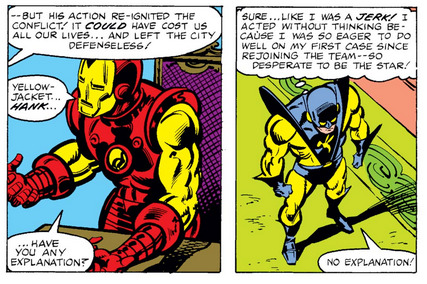
And since “I was a jerk!” isn’t a great defense, Hank goes with “no explanation!”
Without any explanation for his actions, its decided to convene a formal court martial for three days hence. Until then, Yellowjacket is on temporary suspension. Since Avengers don’t carry guns or badges, he’s asked to turn over his Avengers’ priority ID card. Which presumably gets you discounts at the snack bar as well as some sway with the government and such.
Hank protests but the rules are firm and Hank himself helped write them back in the day.

Outside the... meeting room? Tiny library? Gosh, I’d love a layout to the Avengers mansion. Why aren’t they meeting in their sweet conference room- oh right. The table shrank.
Anyway, outside wherever, Wasp in her new... and frankly lingerie-looking costume is fretting.
(Jan, why are your fashion instincts so hit and miss and miss?)
And then Tigra boops her on the head.
Tigra has continued to be as cat as an equivalent weight in cats and has climbed the wall to hang out on the wall trim. Somehow.
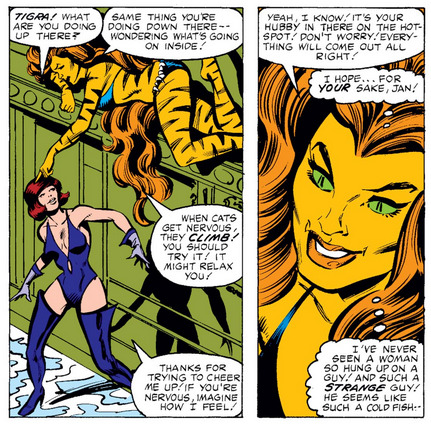
Wasp: “Tigra! What are you doing up there?”
Tigra: “Same thing you’re doing down there -- wondering what’s going on inside! When cats get nervous, they climb! You should try it! It might relax you!”
Tigra also assures Wasp that everything will be alright but privately hopes that it will be. And also dunks on Hank a little.
Tigra: (I’ve never seen a woman so hung up on a guy! And such a strange guy! He seems like such a cold fish... all wrapped up in whatever murky stuff is churning around inside himself! He gives me the creeps!)
Yellowjacket comes out of the whatever room and Wasp is immediately on him, asking he hold her. And he’s like
mmnnyurrh
Yellowjacket: “Jan, just -- just get away from me! Leave me alone! Haven’t I got enough to contend with without you slobbering all over me?”
When she turns away sadly he apologizes and hugs her, saying he’s just afraid because the Avengers are going to court martial him.
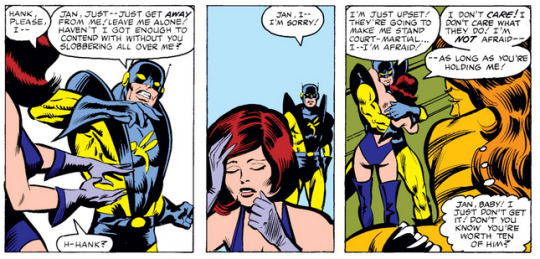
A still lurking on the wall like a five foot something cat Tigra wonders to herself “Jan, baby! I just don’t get it! Don’t you know you’re worth ten of him?”
She’s right and she should say it.
The pre-court martial panel splits, to meet up again in three days for the court martial.
Captain America flips off the roof into a thunderstorm to get some serious thinking and flashbacking done. He’s extra like that. I mean, seriously. There’s a front door, STEVE.

Cap: “I wonder... am I doing the right thing? Was Yellowjacket’s action just a mistake -- ? Something that could happen to anyone?”
He thinks back to the war, when he in disguise as Perfectly Average Steve Rogers PFC was on a recon patrol and his unit ran right into a huge German advance.
His unit got cut to pieces around him until he was the only one left. At that point, he ripped his uniform off to reveal he was dressed in layers as CAPTAIN AMERICA.
I was going to snark that his secret identity was worth more than the lives of his unit but I dunno that even a Captain America could have done much to save his GI guys. The way its portrayed and all. Steve even thinks that his number is up so might as well go out as CAPTAIN AMERICA.
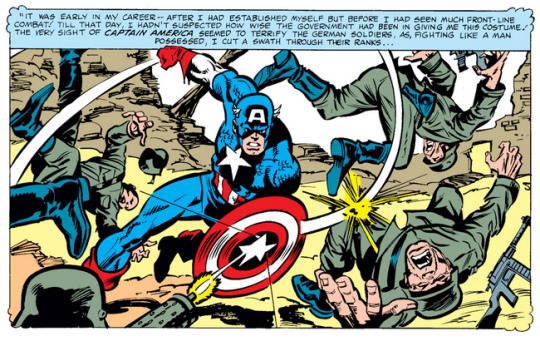
“It was early in my career -- after I had established myself but before I had seen much front-line combat! Till that day, I hadn’t suspected how wise the government had been in giving me this costume! The very sight of Captain America seemed to terrify the German soldiers, as, fighting like a man possessed, I cut a swath through their ranks...”
Cap fought and fought until there were no more enemies standing. Surrounded by collapsed and probably unconscious and not at all dead German soldiers.
He hears a sound behind him and acting on battle instinct he throws his mighty shield with the intention to make someone yield.
But: instant regrets.

“The sound was a child... a war orphan, collecting brass to sell for money to buy food! Thank god, she was bending to pick up a shell casing just as my shield would have struck! Meant to stun a full-grown man, it probably would have broken her neck if it had hit!”
Wow! Cap almost killed an orphan!
The point being that Cap wonders if he has the right to accuse Hank, when “there, but for the grace of god...”
Meanwhile, Iron Man has stayed back at the mansion to refresh his memories with some research in the Avengers records.
This is one part a montage of previous Hank Pym moments and one part ‘actually I did do the research before I wrote this’ from Jim Shooter.
Because, yeah, Jim Shooter, according to Jim Shooter, went back and reread every single appearance by Hank Pym and Janet Van Dyne before writing this story. Believe it or don’t but the montage is here so he at least did enough to get panels to reference or reuse.
Iron Man notes Hank’s tendency to change identities and costumes frequently, how his gaining the power to go giant didn’t work out too well for him, how he left and rejoined the group, never seemed comfortable with the Avengers, and in Iron Man’s estimation that he felt outclassed by the other founders.
And perhaps the reason he kept ping ponging between the team and his research was a lack of success in either one. How his attempts to achieve a scientific breakthrough to prove himself (I guess Pym Particles are a case of ‘what have you done for me lately?’ or just that he didn’t want to be a one-hit wonder) bore only Ultron, one of the Avengers’ deadliest enemies.
Iron Man: “But I wonder... can he ever truly be free of the spectre of Ultron -- ? Can he ever be more than a haunted, hollow man drowning in a sea of guilt over the wrongs done by his monstrous creation? Can he ever rid himself of the desperate need he has to redeem himself in his own eyes?”
That’s a hell of a way to talk about your friend, Tony. I know the Avengers have a policy of not interfering in each others personal lives but its probably not the best policy to watch him struggling and just wait to see if he figures out his shit on his own.
I don’t know.
Iron Man: “And if he is in that kind of inner turmoil, he needs our help... our support... our love! Hank is a friend to us all... a founder of this group! How can we turn our backs on him when he needs us most? How dare we punish him for a mistake that any of us might have made?”
Oh! Well! Learn me to not flip the page. I guess in fairness Hank has been at his worst here than previous times.
Anyway, as I said, Tony doing this research mirrors Jim Shooter doing his research. And Tony reaches much the same conclusion as Shooter does, although perhaps more kindly worded.
Jim Shooter: “Back in 1981 I was writing the Avengers. Hank Pym aka Yellowjacket was married to Janet Van Dyne aka the Wasp and things had not been going well for him for a long time. Before I embarked on the storyline ... I reread every single appearance of both characters. His history was largely a litany of failure, always changing guises and switching back and forth from research to hero-ing because he wasn’t succeeding at either. He was never the Avenger who saved the day at the end and usually the first knocked out or captured. His most notable ‘achievement’ in the lab was creating Ultron. Meanwhile, his rich, beautiful wife succeeded in everything she tried. She was also always flitting around his shoulders, saying things to prop up his ego.”
Geez, Jim.
I don’t know about Hank never saving the day at the end. Never is a bit much. But I don’t want to reread 213 minus issues to say for sure.
But this is the portrayal of Hank that went into writing this story and Iron Man is the one who speaks it aloud.
Outside the mansion, Wasp and Yellowjacket run into a group of young fans right as they leave. The fans all want Wasp’s autograph and mistake Hank’s codename for Bumblebee and ask if he’s ever done anything.
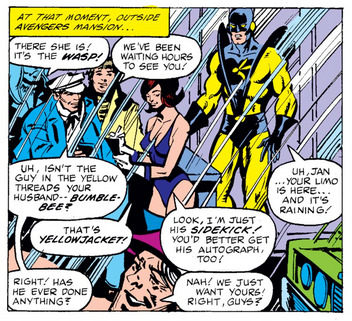
Wasp: “Look, I’m just his sidekick! You’d better get his autograph too!”
A child, probably: “Nah! We just want yours! Right, guys?”
This is like that scene with Hulk in Endgame where he tries to get the fans to appreciate Ant-Man too, to Scott’s growing annoyance with the situation. Except not as played for laughs.
On their limo ride to their Cresskill, NJ home, Wasp tells Hank not to let those smart-aleck kids get to him.
Yellowjacket: “... Well, they were right! What have I ever done? Nothing!”
Wasp: “Hank, don’t be silly! Oh, who cares what they think? You’ll always be my hero!”
In fairness, Wasp has been actively on the team for a bit and memories are short. Hank’s been busy in his lab. Which Wasp reminds him but that's the lab she paid for and where he’s accomplished NOTHING!
The staff of the house also dig the knife in a little, possibly unintentionally but eh who can say. When they address the couple Mrs. Pym, aka the person who signs their checks is primary and Hank is the after thought. But possibly they just interact more with Jan if Hank has been cooped up in his lab.
Jenkins: “Welcome home, Mrs. Pym! Uh, you too, sir!”
Jenkins in the next panel: “Madame, would you like us to begin preparing your luncheon now? And Mr. Pym’s too, of course!”
And then, things get awkward. Although oh lord, Jan is trying.
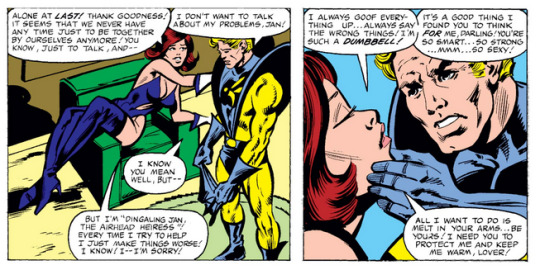

Wasp: “Alone at last! Thank goodness! It seems that we never have any time just to be together by ourselves anymore! You know, just to talk, and --”
Yellowjacket: “I don’t want to talk about my problems, Jan! I know you mean well, but --”
Wasp: “But I’m ‘dingaling Jan, the airhead heiress’! Every time I try to help I just make things worse! I know! I -- I’m sorry! I always goof everything up... always say the wrong things! I’m such a dumbbell! It’s a good thing I found you to think for me, darling! You’re so smart... so strong... mmm... so sexy! All I want to do is melt in your arms... be yours! I need you to protect me and keep me warm, lover! Oh, Hank! Let’s just sneak off to bed and cuddle and kiss and -- and let me show you how much I love you! Whaddaya say, big boy?”
Yellowjacket: “Uh... not now, honey! I -- I’m just, just a little too tense now! You understand, don’t you? I think I’ll go putter around in the lab for awhile! Maybe that’ll relax me! See you later... okay?”
Eeesh.
Eeeeeeeeesh. It almost hurts watching Jan diminish herself so much to try to make him feel better.
Although a lot of her solutions seem to be ‘lets make out until you feel better’ but she did offer to talk. Not even about anything specific. And Hank automatically assumes that the only thing to possibly talk about is his problems.
Hank locks himself up in his lab, realizing that he’s disappointed Jan but saying that its better to not even try to get romantic while he’s this upset.
Yellowjacket: “I wouldn’t blame her if she hated me! I’m a failure as a husband... just like I’m a failure as a hero! So here I am again, hiding out in the lab... where I’m a failure as a scientist! I hate this place! ... But I keep coming back -- because, here at least I had one success!”
And yes, that one success he credits himself with... is Ultron!

Yellowjacket: “Yes... here I accomplished what no one else ever has! I built a robot capable of independent thought! Here, I created... Ultron! Even that went wrong! Even that, my own success turned into a disaster! A failure! But maybe, just maybe, my one success will yet provide the key to my salvation!”
And he starts putting together a new robot!
Hoooooooooo boyyyyyyyyyyyyy, Hank. Building robots isn’t always the solution!
Also: in order: does the robot Human Torch just not count then? And do Pym Particles not count?
SCENE AND TIME CHANGE
Three days have passed, it is dawn of the three days later.
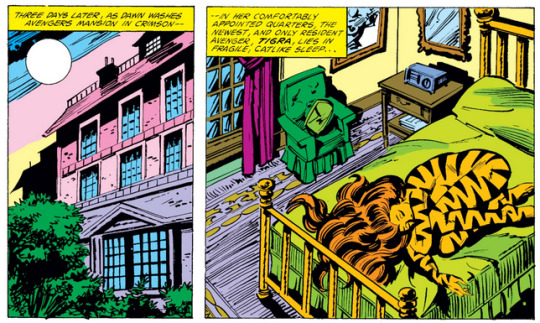
Tigra is spending her morning napping because she is here to cat to the utmost.
Look at this. Ridiculous.
You are a ridiculous individual, Tigra Greer Grant Nelson.
And like a cat, sleep can be a tenuous thing for the faint sound of footstep on carpet outside her room has her spring out of bed and answer the door of her room before Jarvis even knocks.
Because Tigra is here to be a cat and unnerve Jarvis, for reasons which escape me.
She jokes about Jarvis bringing her a mouse for breakfast but he’s really here with her weekly stipend check from Tony Stark.

This is a thing that’s been implied but not explicitly spoken but the Avengers actually get paid for being Avengers. Its not really a salary as much as a stipend.
I don’t know that there’s a difference, except maybe legally. Maybe in regards to taxes. Maybe stipends don’t get income taxed and you don’t need to submit a form to the IRS.
That our Tony! Ha ha ha pay your taxes ya dink
Anyway, the weekly check is a ‘merely’ a modest stipend to defray miscellaneous living expenses. Most Avengers refuse the stipend because, well, they don’t need it! And most Avengers aren’t going to pocket a thousand dollars they don’t need just to laugh at Tony for handing out free money.
Your Thors, Iron Mans, Wasps and Antgiantyellowjacket Men.
But the Avengers that live in the mansion and have no outside means of support (definitely Hawkeye whenever he was on the team, definitely Beast and he definitely bought weed with it, Wonder Man, probably Scarlet Witch and Vision) accept the money.
Tigra: “Well, I’ll sure take it! I’m tired of being broke!”
And then she actually looks at the check.

Tigra: “Jarv, this check -- ! It’s for a thousand dollars!”
Jarvis: “If that is not sufficient, madame, I’m sure Mr. Stark would be happy to increase the amount!”
Tigra: “Increase the --! No, that’s okay, Jarv! This’ll do just fine! Whee! We’re in the money... we’re in the money!”
So according to an online calculator $1000 in 1981 dollars is worth about $2,820.56 in 2020 dollars!
Plus no rent because firemen sleep in the firehouse!
Being good really is its own reward! Where do I get some superpowers, an invitation to the Avengers, and probably a c-list fodder death in the next event!
Ok so maybe its not all great to be an Avenger. But the monetary compensation certainly sounds good to some!
And it bears mentioning that Tigra signed up to be an Avenger when all she thought she’d get out of it was a place to sleep and a chance to do hero stuff.
Anyway, Jarvis also reminds her that she has to attend the court martial meeting at four, prompting her to say “Aw! Don’t remind me of downers like that now, Jarv!”
You’re a classy person, Tigra.
Stop sexually harassing the butler and also anyone. Its just uncomfortable.
And poor Jarvis continues to be allergic to cats and giant woman cats. Poor, poor Jarvis.
As four approaches, the Avengers all start to head to the mansion for the court martial.
Iron Man as Tony Stark, normal billionaire man, cuts short a board meeting claiming another appointment. One of the board members is like lucky dog is probably off to a date with a startlet but oh ironies man, Tony would trade places with the board guy Dillworth if he could because he’s not looking forward to this.
And at Upper West Side Medical Clinic, Brilliant Perfectly Normal Surgeon Dr. Donald Blake is doing surgery when he realizes drat that Avengers meeting is soon.
So he asks the other doctors to finish up without him and takes off.
In fairness, in fairness! The patient was out of mortal peril. It was just the closing up and such that was left. But the other doctors are like look at that arrogant doctor man, he may be the best doctor on Earth but I don’t like his attitude.
And in the court martial room waits Captain America. Still stuck in that conundrum he’s been in.
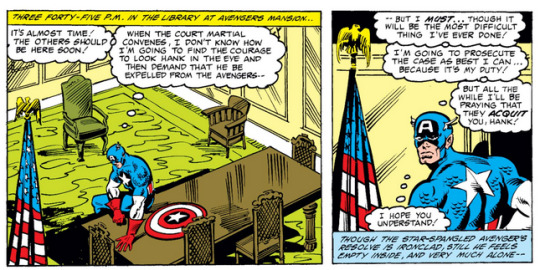
Captain America: “When the court martial convenes, I don’t know how I’m going to find the courage to look Hank in the eye and then demand that he be expelled from the Avengers -- but I must... though it will be the most difficult thing I’ve ever done! I’m going to prosecute the case as best I can... because it’s my duty! But all the while I’ll be praying that they acquit you, Hank! I hope you understand!”
Cap is at least fair handed here. This is exactly the treatment he demanded for himself in the Charles Soule She-Hulk series where he asked Matt Murdock to prosecute the hell out of him and She-Hulk to be his defense in a wrongful death lawsuit.
The idea is this: if Hank is acquitted, then it clears his name without a shadow of a doubt because Cap wouldn’t have gone easy. Accountability, its a hell of a thing.
BUT NOW WE GO BACK SEVERAL HOURS to Cresskill and the casa de Wasp.
Janet woke up and found no Hank. He’s been locked in his lab since they got back from the pre-court martial three days ago. And she’s gotten worried that he’s hurt himself or gotten ill so she decides to invade his privacy a little bit.
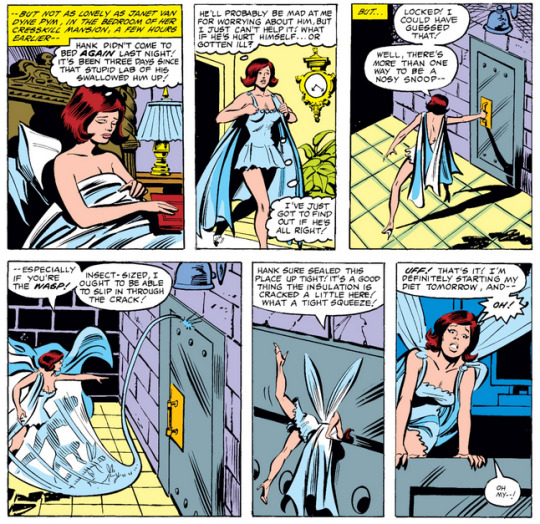
Hank has locked the lab door but Jan can just about wriggle through the top because the insulation is a little cracked.
So she squirms into the very small gap between door and frame.
And finds Hank has built a medium giant robot.
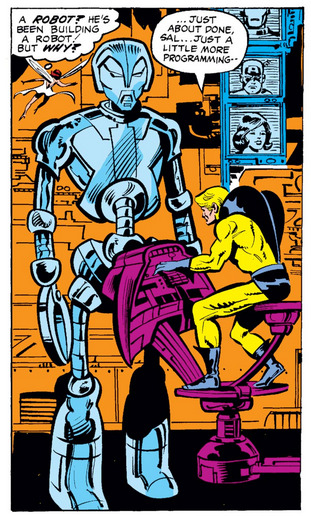
He’s just finishing up the programming. Because he’s programming the robot (he calls it Sal, short for Salvation I) to locate and identify the Avengers visually as well as by brain-wave patterns.
Hank this is all very dubious! I can’t think of a good reason why you might secretly be building a robot and putting all of your friends’ faces in it!
But Sal’s detectors are running and its suddenly pinging two Avengers in the area, not one. And when Hank turns on the visual scan system to check, whoops! Jan’s here! Jan saw your robot!
Hank freaks out a little bit.
He slams his fist on the computer near where tiny bug her is standing and shouts.
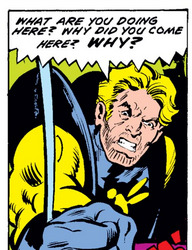
Yellowjacket: “What are you doing here? Why did you come here? WHY?”
She tells him that she was worried because she hasn’t seen him in days but he accuses her of spying on him.
Jan reiterates that she wasn’t spying. She just wanted to make sure he was ok.
Annnnnnd. Hank decides that Jan being here is a serendipitous chance to test his new robot!
By having it attack Jan!
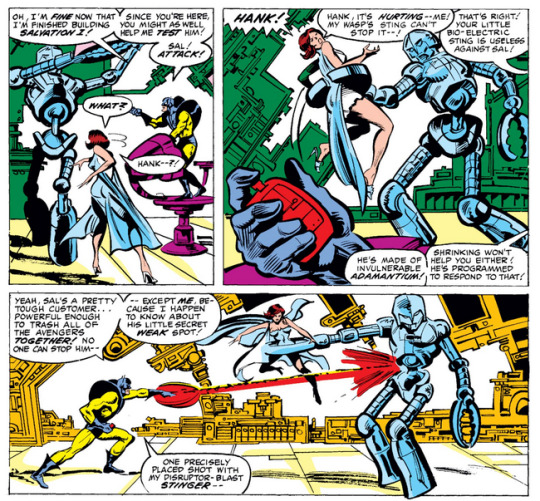
HANK!
Sal charges Jan and grabs her in its giant pincer hands. Jan tries blasting it with her bio-electric sting but to no effect.
As Hank brags Sal is made of invulnerable adamantium. Plus plus plus, he’s programmed to respond if she tries shrinking.
Yellowjacket: “Yeah, Sal’s a pretty tough customer... powerful enough to trash all of the Avengers together! No one can stop him -- except me, because I happen to know about his little secret weak spot! One precisely placed shot with my disruptor-blast stinger -- and Sal collapses, defeated!”
Jan then asks the pertinent question.
Hank Pym what the hell is this robot for??
Yellowjacket: “Why, I’m going to save my career, Jan! That’s what I’m going to do! Let’s be realistic, shall we? The charge against me is ‘endangering the safety of fellow Avengers and civilians through neglect’! The penalty is expulsion! They’re going to boot me out! This ‘court martial’ is just a formality!”
This isn’t a good plan. Nothing here is good. Only bad things will occur.
I’m not being silly, for a change. This is a bad scene.
It does what it intends to do, more or less. But its uncomfortable.
Jan is like c’mon don’t think like that. And Hank is like well, I’m going to give it a chance. But if things start going badly, boy howdy, I’m going to summon a robot to beat up my friends! Also Hank himself! That’s right! He programmed a robot to beat the shit out of him!
And then when things look their worst, Hank will save the day by blasting the robot in the secret weak spot and saving the day!
Jan tells him not to do this dumb thing.
Yellowjacket: “SHUT UP! I’ve got to do this! I’ve got to save the day right before their eyes! Don’t you see? It’s my only chance to redeem myself! It’s the only way!”

And there’s no way to really sugarcoat this. Hank just hauls off and hits her.
Or makes a very dramatic gesture and accidentally strikes her.
Jim Shooter has said that the hit wasn’t in the script.
Jim Shooter: “In that story (issue 213, I think), there is a scene in which Hank is supposed to have accidentally struck Jan while throwing his hands up in despair and frustration - making a sort of ‘get away from me’ gesture while not looking at her. Bob Hall, who had been taught by John Buscema to always go for the most extreme action, turned that into a right cross! There was no time to have it redrawn, which, to this day has caused the tragic story of Hank Pym to be known as the ‘wife-beater’ story.”
I don’t know. As I said last time with Gorn and Linnea, Hank is reflected in Gorn. And Gorn intentionally hit Linnea.
This doesn’t necessarily mean that it was set in stone that Hank would hit Jan. But it seems like it was foreshadowed in that way.
And here’s the thing: whether Hank intentionally hit her or not doesn’t really matter with how the story comes off and is attempting to come off.
Before he, intentionally or not, hits Jan directly he has also sicked a robot on her (and under-reacts when she says the robot is hurting her) and smashed his fist near her when she was small sized.
Any one of these would be unacceptable behavior.
And even if it was an accidental hit, Hank doesn’t express remorse or guilt or even awareness that he did a bad thing. He just keeps ranting as she’s sprawled to the floor.
Yellowjacket: “You’ve got to understand -- ! I can’t let them drum me out of the Avengers! I can’t! It’s all I have left! Since you had to stick your nose into my business, you’re in this with me now, Jan! I’ll keep it simple for you! All you’ve got to do is play along and keep your mouth shut! Got that?”
So. Yeah. Inadvertent or intentional doesn’t really change anything here. His behavior in this entire scene is beyond the pale.
So we time skip to the present of 4:27 PM, twenty-seven minutes after the start of the court martial and twenty-seven minutes of no show.
Tigra is getting frustrated.
Tigra: “I want to get this craziness over with! You know I’ve been an Avenger for a week! I feel pretty silly judging a guy who’s been around since day one!”
She asks if she can just cast a vote for acquittal preemptively and fuck off.
Iron Man says of course not! Although he thinks to himself that if it were possible, he would have done it and probably Thor too.
So that’s the situation regarding the Avengers’ thoughts on this court martial. Tigra wants to just vote to acquit because she’s only been here a week. Iron Man and probably Thor would also like to just vote to acquit. And Captain America is going to prosecute as hard as he can but is secretly hoping that Hank gets acquitted.
Far from Hank’s belief that the court martial is just a formality.
Anyway, Hank and Jan (wearing sunglasses) show up.
Yellowjacket: “Sorry we’re late! The George Washington Bridge was jammed as usual!”
Captain America: “No harm done, Hank!”
Yellowjacket: “You mean you won’t be pressing additional charge for malicious tardiness, Cap?”
Captain America: “Uh... let’s get started!”
Yeah. Off to a great start. Just. Not a good foot, Hank.
So the court martial starts! Thankfully the table has had a growth spurt or maybe got switched out for a bigger table.

So the voting will be by Tigra, Thor, and Iron Man. Wasp may participate but not vote because she’s Hank’s wife. Cap will prosecute.
And begin to prosecute he will do!
Captain America: “Four days ago, Yellowjacket blasted an enemy in the back -- an enemy who had already ceased hostilities! We all know that Hank’s no coward and not one to panic! It was a mistake... a misjudgement made on the spur of a tense, pressured moment! It could have triggered disaster!”
“But it didn’t! We were lucky! So, the temptation is to forget it... write it off! We tend to feel that way because each of us thinks that it’ll happen to us someday!”
“Wrong! We can’t let it happen! We’re the Avengers, not the Brooklyn Dodgers! One ‘error’ by one of us can cost thousands of lives! We don’t dare allow ourselves to think it’s ever all right to make a mistake!”
“Our responsibility is overwhelming! We’ve got to judge ourselves harshly! I recommend for Yellowjacket, as I would for myself, the severest possible penalty!”
So at this point Hank can please guilty to the charges and rely on the mercy of the court or defend himself from the charges.
And Hank decides to plead not guilty, of course!
Okay, so what’s your defense, Hank? You actually have a possible avenue here that Elf-Queen didn’t speak English and you were behind her so it was difficult to tell that hostilities had ceased and plus she had tossed your new teammate into space.
Are you going with something like that?
Yellowjacket: “I don’t deny the sequence of events as Cap described them... more or less! Yes, when it seemed as though the enemy had ceased fighting, my attack -- my ‘mistake’ -- seemed treacherous! But I find it odd that the great Captain America never even once considered treachery on the part of the enemy!”
“She could have been setting him up! By striking when I did, in the way I did, I may have actually saved his life! But is he grateful? No! Why not, one may ask!”
“Well, perhaps you noticed that the ‘enemy’ in question was a beautiful woman! Does he think I didn’t notice the way he was looking at her? Well it’s no wonder he’s so upset!”
“You like her, eh, Cap? And I hurt her -- and that’s why you have this vendetta against me, even though I may have saved your miserable life! Oh yes! I was actually the hero out there! Me! But, then, you turned it all around... you made a fool out of me!”
“And it worked, didn’t it? That’s when she started looking back! Isn’t it? Isn’t it? ISN’T IT?”
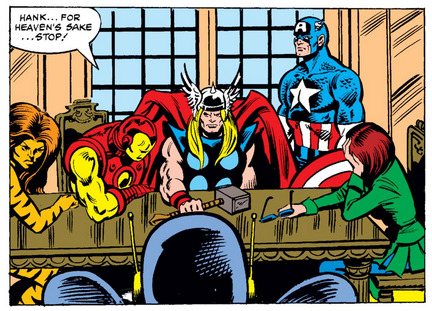
Yeah. That. Just sort of says it all, Iron Man.
Hank senses that maybe his rant wasn’t quite as convincing as it sounded in his head and demands Jan tell them how right he is!
Jan: “... no more! Let it end! I beg you, Hank, if you love me... let it end!”
And Thor sees her black eye and reacts in shock, asking if Hank hit her.
By the by the way, this is also why Chuck Austen’s retcon that Hank had been physically abusing Jan for a while can fuck off. Because in his telling, the Avengers knew for a while and just didn’t do anything.
And I do not like that as a concept.
So since this is going not how he’d prefer, Hank pulls the killer robot remote out of his outside pants and activates the killer robot.
Its got to be sunk cost at this point, right?
Even if he saves the day from the killer robot, does he think that they’re going to forget the black eye and his rant that really Captain America is too horny?
AND THEN THE ROBOT BUSTS IN THROUGH THE WALL AND STARTS BEATING EVERYONE UP
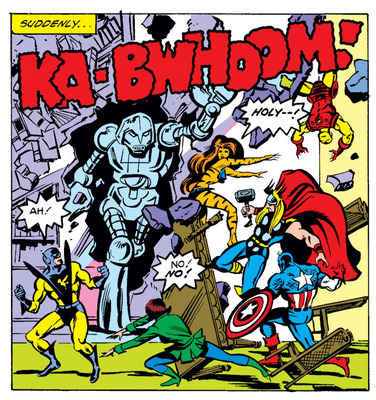
with a KA-BWHOOM! naturally.
The Avengers rally despite the surprise and try to fight back but the robot is made of adamantium and we know how much trouble the Avengers always have with Ultron.
Cap tries throwing his shield at Sal and it doesn’t even yield! In fact, Sal catches the shield and slams it into Cap’s chest. Possibly caving in his ribs.
Iron Man tries to draw Sal off of the others by shooting repulsors at it but Sal zooms over really quick and punches him in the chest before he can react.
At this point Hank begins to have the faintest inklings that maybe he’s done a bad, specifically in creating a killer robot and programming it to attempt murder on his friends.
Yellowjacket: “I -- I hadn’t realized just how deadly, how savage Sal would be in full attack mode! I’ve got to zap his weak point before he hurts someone bad!”
And he probably forgot that he programmed Sal to kill him too because when Yellowjacket goes for the weak point, Sal swivels around and hits Yellowjacket, sending him WHOK!ing into the wall.

Oh. Hey. Sal’s turn and smack pose is vaguely similar to the thing between Hank and Jan.
Wonder if that’s intentional.
Hank is knocked so for a loop (by a robot that, I’ll remind you, he programmed to beat him up) that he almost passes out and has to struggle to his feet.
But he has to stay conscious because he’s the only one that can stop the threat he himself created!
And since Sal is kicking the shit out of Thor, the threat that Hank himself created really is a big one!
Yellowjacket: “C’mon, Hank! Suck it up! Make the room stop whirling! Focus... focus on the weak spot! Aim... disruptors on full force!”
But Hank takes too long and Sal finishes beating up Thor and grabs Hank in his claws. And hey more mirroring maybe! Like Jan before, Hank is in Sal’s claws and is being crushed.
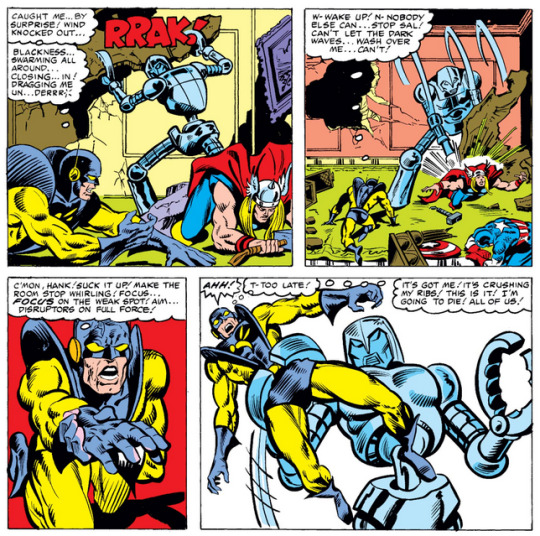
And to fit the mirroring, Jan comes to Hank’s rescue. But out of actual, factual real concern for Hank’s pain unlike Hank earlier not reacting to Jan’s pain.
Again, I wonder if it was intentional. And I think in this case it must be?
Its because Hank put her through this nonsense earlier that Jan knows where the weak spot is and can blast it to save the day, the Avengers, and Hank.
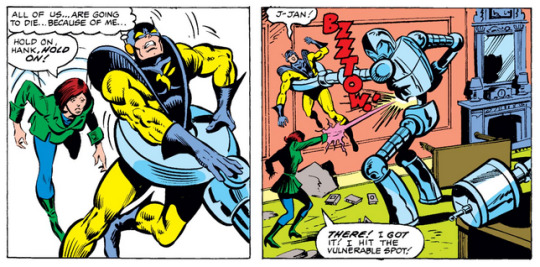
Sal plops over with a KLANG!
And Hank...
Is not grateful.
Yellowjacket: “Why? Why did it have to be Jan? If -- if I couldn’t do it... why her? Why? Why?”
After everything, after every way in which his own plans spectacularly crashed and burned, he’s still most concerned that Wasp outshone him?
Lets let Thor put it best.
Thor: “Thy plan... was foolish, Yellowjacket! A base and transparent ruse!”
But Yellowjacket doesn’t hear Thor or anything really.
Yellowjacket: “guess i’ll go now... guess... i’ll go.”
And he lurches out the door in a bit of a daze.
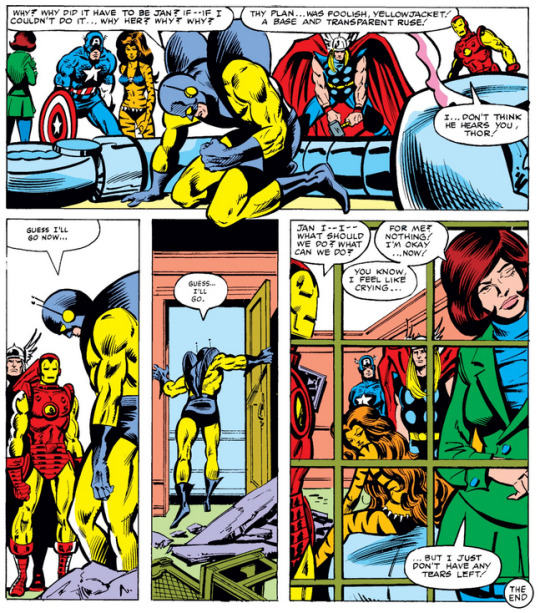
Iron Man: “Jan I -- I -- what should we do? What can we do?”
Wasp: “For me? Nothing! I’m okay... now! You know, I feel like crying... but I just don’t have any tears left!”
And that’s that.
I’ve said a lot of what I’ve had to say as we went along.
There’s more to come in this particular arc. Hank isn’t done yet!
What an ominous statement.
Follow @essential-avengers because I’m doing a good job, maybe. Please also like and reblog.
#Avengers#Yellowjacket#hank pym#the wasp#Sal the robot who offers hugs#Captain America#Thor#Iron Man#Tigra#essential avengers#essential marvel liveblogging#who would have thought a court martial would go so bad#you had THREE WHOLE DAYS to prepare your defense#geez tho geez#cw domestic abuse
18 notes
·
View notes
Photo


~ Duc de Saint-Simon: The Court of Louis XIV~
“The Duc de Saint-Simon resided for many years at Versailles. He left an account of Life there”
‘The Court’
“His natural talents were below mediocrity; but he had a mind capable of improvement, of receiving polish, of assimilating what was best in the minds of others without slavish imitation; and he profited greatly throughout his life from having associated with the ablest and wittiest persons, of both sexes, and of various stations.
He entered the world (if I may use such an expression in speaking of a King who had already completed his twenty-third year), at a fortunate moment, for men of distinction abounded. His Ministers and Generals at this time, with their successors trained in their schools, are universally acknowledged to have been the ablest in Europe; for the domestic troubles and foreign wars under which France had suffered ever since the death of Louis XIII had brought to the front a number of brilliant names, and the Court was made up of capable and illustrious personages....
Glory was his passion, but he also liked order and regularity in all things; he was naturally prudent, moderate, and reserved; always master of his tongue and his emotions. Will it be believed? he was also naturally kind-hearted and just. God had given him all that was necessary for him to be a good King, perhaps also to be a fairly great one. All his faults were produced by his surroundings.
In his childhood he was so much neglected that no one dared go near his rooms. He was often heard to speak of those times with great bitterness; he used to relate how, through the carelessness of his attendants, he was found one evening in the basin of a fountain in the Palais-Royal gardens....
His Ministers, generals, mistresses, and courtiers soon found out his weak point, namely, his love of hearing his own praises. There was nothing he liked so much as flattery, or, to put it more plainly, adulation; the coarser and clumsier it was, the more he relished it. That was the only way to approach him; if he ever took a liking to a man it was invariably due to some lucky stroke of flattery in the first instance, and to indefatigable perseverance in the same line afterwards. His Ministers owed much of their influence to their frequent opportunities for burning incense before him....
It was this love of praise which made it easy for Louvois to engage him in serious wars, for he persuaded him that he had greater talents for war than any of his Generals, greater both in design and in execution, and the Generals themselves encouraged him in this notion, to keep in favour with him. I mean such Generals as Condé and Turenne; much more, of course, those who came after them.
He took to himself the credit of their successes with admirable complacency, and honestly believed that he was all his flatterers told him. Hence arose his fondness for reviews, which he carried so far that his enemies called him, in derision, "the King of reviews"; hence also his liking for sieges, where he could make a cheap parade of bravery, and exhibit his vigilance, forethought, and endurance of fatigue; for his robust constitution enabled him to bear fatigue marvellously; he cared nothing for hunger, heat, cold, or bad weather.
He liked also, as he rode through the lines, to hear people praising his dignified bearing and fine appearance on horseback. His campaigns were his favourite topic when talking to his mistresses. He talked well, expressed himself clearly in well-chosen language; and no man could tell a story better. His conversation, even on the most ordinary subjects, was always marked by a certain natural dignity.
His mind was occupied with small things rather than with great, and he delighted in all sorts of petty details, such as the dress and drill of his soldiers; and it was just the same with regard to his building operations, his household, and even his cookery. He always thought he could teach something of their own craft even to the most skilful professional men; and they, for their part, used to listen gratefully to lessons which they had long ago learnt by heart.
He imagined that all this showed his indefatigable industry; in reality, it was a great waste of time, and his Ministers turned it to good account for their own purposes, as soon as they had learnt the art of managing him; they kept his attention engaged with a mass of details, while they contrived to get their own way in more important matters.
His vanity, which was perpetually nourished - for even preachers used to praise him to his face from the pulpit - was the cause of the aggrandisement of his Ministers. He imagined that they were great only through him, mere mouthpieces through which he expressed his will; consequently he made no objection when they gradually encroached on the privileges of the greatest noblemen. He felt that he could at any moment reduce them to their original obscurity; whereas, in the case of a nobleman, though he could make him feel the weight of his displeasure, he could not deprive him or his family of the advantages due to his birth. For this reason he made it a rule never to admit a seigneur to his Councils, to which the Duke de Beauvilliers was the only exception....
But for the fear of the devil, which, by God's grace, never forsook him even in his wildest excesses, he would have caused himself to be worshipped as a deity. He would not have lacked worshippers.... ‘Life at Versailles’ Very early in the reign of Louis XIV the Court was removed from Paris, never to return. The troubles of the minority had given him a dislike to that city; his enforced and surreptitious flight from it still rankled in his memory; he did not consider himself safe there, and thought cabals would be more easily detected if the Court was in the country, where the movements and temporary absences of any of its members would be more easily noticed.... No doubt that he was also influenced by the feeling that he would be regarded with greater awe and veneration when no longer exposed every day to the gaze of the multitude.
His love-affair with Mademoiselle de la Vallière, which at first was covered as far as possible with a veil of mystery, was the cause of frequent excursions to Versailles. This was at that time at small country house, built by Louis XIII to avoid the unpleasant necessity, which had sometimes befallen him, of sleeping at a wretched wayside tavern or in a windmill, when benighted out hunting in the forest of St. Leger....
The visits of Louis XIV becoming more frequent, he enlarged the château by degrees till its immense buildings afforded better accommodation for the Court than was to be found at St. Germain, where most of the courtiers had to put up with uncomfortable lodgings in the town. The Court was therefore removed to Versailles in 1682, not long before the Queen's death. The new building contained an infinite number of rooms for courtiers, and the King liked the grant of these rooms to be regarded as a coveted privilege.
He availed himself of the frequent festivities at Versailles, and his excursions to other places, as a means of making the courtiers assiduous in their attendance and anxious to please him; for he nominated beforehand those who were to take part in them, and could thus gratify some and inflict a snub on others. He was conscious that the substantial favours he had to bestow were not nearly sufficient to produce a continual effect; he had therefore to invent imaginary ones, and no one was so clever in devising petty distinctions and preferences which aroused jealousy and emulation.
The visits to Marly later on were very useful to him in this way; also those to Trianon, where certain ladies, chosen beforehand, were admitted to his table. It was another distinction to hold his candlestick at his coucher; as soon as he had finished his prayers he used to name the courtier to whom it was to be handed, always choosing one of the highest rank among those present....
Not only did he expect all persons of distinction to be in continual attendance at Court, but he was quick to notice the absence of those of inferior degree; at his lever, his coucher, his meals, in the gardens of Versailles (the only place where the courtiers in general were allowed to follow him), he used to cast his eyes to right and left; nothing escaped him, he saw everybody.
If any one habitually living at Court absented himself he insisted on knowing the reason; those who came there only for flying visits had also to give a satisfactory explanation; any one who seldom or never appeared there was certain to incur his displeasure.
If asked to bestow a favour on such persons he would reply haughtily: "I do not know him"; of such as rarely presented themselves he would say, "He is a man I never see"; and from these judgements there was no appeal.
He always took great pains to find out what was going on in public places, in society, in private houses, even family secrets, and maintained an immense number of spies and tale-bearers. These were of all sorts; some did not know that their reports were carried to him; others did know it; there were others, again, who used to write to him directly, through channels which he prescribed; others who were admitted by the backstairs and saw him in his private room.
Many a man in all ranks of life was ruined by these methods, often very unjustly, without ever being able to discover the reason; and when the King had once taken a prejudice against a man, he hardly ever got over it....
No one understood better than Louis XIV the art of enhancing the value of a favour by his manner of bestowing it; he knew how to make the most of a word, a smile, even of a glance. If he addressed any one, were it but to ask a trifling question or make some commonplace remark, all eyes were turned on the person so honored; it was a mark of favour which always gave rise to comment....
He loved splendour, magnificence, and profusion in all things, and encouraged similar tastes in his Court; to spend money freely on equipages and buildings, on feasting and at cards, was a sure way to gain his favour, perhaps to obtain the honour of a word from him.
Motives of policy had something to do with this; by making expensive habits the fashion, and, for people in a certain position, a necessity, he compelled his courtiers to live beyond their income, and gradually reduced them to depend on his bounty for the means of subsistence.
This was a plague which, once introduced, became a scourge to the whole country, for it did not take long to spread to Paris, and thence to the armies and the provinces; so that a man of any position is now estimated entirely according to his expenditure on his table and other luxuries. This folly, sustained by pride and ostentation, has already produced widespread confusion; it threatens to end in nothing short of ruin and a general overthrow”
“From The Memoirs of the Duke de Saint-Simon, ed. F. Arkwright (New York Brentano's, n.d.), Vol. V, pp. 254, 259-63, 271-274, 276-278.”
Link: https://sourcebooks.fordham.edu/mod/17stsimon.asp
#Louis XIV#King Louis#King Louis XIV#House of Bourbon#Bourbons#Versalles#Duc de Saint Simon#saint-simon#primary resources#Modern Age France
2 notes
·
View notes
Text
Jimmy Stewart and the WW2 Mission That Almost Broke Him
https://ift.tt/3oDIaDK
The sound of the impact is deafening. More than 18,000 feet above the German city of Fürth, the World War II B-24 bomber they call Dixie Flyer has just delivered its full payload onto a German manufacturer, devastating its ability to build military aircrafts and turning the airfield into a scrap heap. But even before making the full turn out of Bavaria, Dixie Flyer’s copilot and the leader of this bombing group, Maj. James Stewart (Jimmy Stewart to his fans), is nearly lifted out of his chair.
That’s because a German shell (or flak) has pierced directly through the center of his B-24 Liberator. The whiplash is so intense that only harnesses keep him in his seat. Still, Stewart rises in the air; pilot Capt. Neil Johnson’s hands are briefly shaken from the controls; and for a moment, the entire plane is consumed with smoke as it violently ascends. When Stewart finally gets his bearings, he’s able to look down and see the hole in the aircraft—the edge of it is inches from his boot. Almost two feet in width, the gap offers a clear view through the plane’s fuselage and straight on to the German landscape below.
There is little time to worry though. The German ground defenses and their .88 shells are rattling the sky with more flak, and out of the corner of his eye, Stewart can see one of his planes, and his crews, also get hit. They’re not so lucky as a wing comes off and the craft falls to the earth. Meanwhile, German Focke-Wulf 190 fighters are beginning to swarm.
Stewart’s 445th Bombing Group only have each other and the tightness of their formation for protection—the Eighth Air Force and RAF fighters that accompanied the mission are spread too thin across the rest of Operation Argument’s ambitious list of targets to help—and they’re a long way from home.
It was the fifth day of the Eighth Air Force’s Big Week in February 1944, and Stewart was on his 10th combat mission in the air as either a group, wing, or squadron leader. This is what he left Hollywood for, circumvented Louis B. Mayer to participate in, and felt a lifetime of obligation to fulfill. It would be his finest moment in the air. It also would be the one that almost broke him.
The Mission of a Lifetime
Long before he entertained the idea of movie stardom, James Maitland Stewart felt the call of military service. In many ways, it was viewed as his birthright. His father’s father, the original James Maitland Stewart, served in the Union Army during the Civil War, participating in the valley campaigns of Shenandoah and serving under Gen. Philip Sheridan and a young officer named George Armstrong Custer. His maternal grandfather was at Gettysburg and Fredericksburg (he would die before “Jimmy” was born). And as a boy in the 1910s, the younger James Stewart would sit on his namesake’s knee, hearing eyewitness accounts about the war that preserved the United States.
Around the same time, young Jim was also receiving German helmets and paraphernalia shipped home by his father Alexander Stewart, who was off in Europe serving in World War I. Jim would use these real mementos of war in the makeshift plays he’d put on at his home in Indiana, Pennsylvania.
Biographer Robert Matzen, who authored the definitive account of Stewart’s World War II years, Mission: Jimmy Stewart and the Fight for Europe, tells us this background had a formative influence on the rest of Stewart’s life and his sense of duty, which he carried with him on the train to Hollywood and then, eventually, on the plane ride out of it.
“All of these things added up into this sort of nexus of ‘I will serve, I have to serve, it’s my duty, it’s my time,’” Matzen says during a Zoom conversation. “And when the time came, he answered the bell. He was so fast out of the gate in the sweepstakes for World War II that he was in the first draft class. He willingly went. It’s not that he enlisted, he was drafted, but he was happy to be drafted. He called it winning the lottery.”
Indeed, Stewart’s then-recent status as a movie star of the 1930s was practically an accident, at least as far as MGM, the studio which held his contract, was concerned. The studio’s top brass viewed Stewart as a possible character actor or background comic talent. But then Frank Capra saw the everyman appeal in Jim’s thin frame and irrepressible earnestness, and cast him in You Can’t Take It with You (1938) and Mr. Smith Goes to Washington (1939)—on loan at Columbia Pictures.
Stewart of course positioned himself to have that career, just as he positioned himself to be ready to serve if his country ever needed him. Hence alongside his sense of service and sacrifice, he also carried a passion for flying. And as soon as his movie star bona fides were cemented, he celebrated by flying his personal aircraft, a military trainer, learning his way around the skies.
“There’s so many things to think about up there that you forget things down below,” Stewart told an interviewer in the late 1930s. “Flying is something altogether different from the way I’m earning my living. That’s what I like about it… Flying is sort of a guarantee that life will continue to have variety.”
According to biographer Matzen, it also was a guarantee he’d be ready to serve when the time came.
“Step by step, he set himself up to end up in England in a bomb group,” Matzen says. “One of those steps was taken years before he was drafted, and that was when he became a star in Hollywood and bought a plane that was an army trainer and proceeded to learn to fly and train, and log hours on that plane so that he could be a pilot when the war came. And war seemed inevitable by 1938.”
Stewart even used his off-time to prepare for it. Says Matzen, “He took out a trip to Europe toward the end of ’39 to get the lay of the land because he thought he was going to end up fighting there.”
James Stewart and Margaret Sullavan in the 1930s about to fly in his Stinson Voyager plane. Courtesy of Robert Matzen and the Jay Rubin Collection.
The ‘I’m a Movie Star’ Card
That preparation served Jim well. While he was initially rejected from service in 1940—more than a year before the Japanese attack on Pearl Harbor—his capability as a flyer, and ability to find a doctor to explain that this 32-year-old man’s unusually thin frame was due to genetics and not ill-health, kept him in line to not only be drafted early but excel in the U.S. Army Air Corps.
“He was deferred in October of 1940 and his father was furious,” says Matzen. “He thought that Jim was in on the deferment for some reason. And Alex called him and chewed him out, and it made the papers that his father chewed him out. But it wasn’t anything. That’s what I think sent Jim back to talk to that doctor and get this letter written that was his carte blanche to get into the military.” That same letter was also the first record Matzen found at the top of Stewart’s military file more than 70 years later. It was the piece of paper which got him into the service and, along with his capability as a flyer, helped him rise all the way to the rank of brigadier general while serving in the Air Force Reserve in the 1950s.
That talent is also how Stewart circumvented the wishes of commanding officers and Louis B. Mayer, who likely applied pressure on the government to keep Stewart stateside during the war, essentially to make propaganda films for the First Motion Picture Unit.
“Jim was furious when that happened, because that was not his intention,” Matzen says. “He was a movie star of the first order who walked away from Hollywood. He took his fame with him and it did allow him to speak to officers that otherwise would not talk to a private and then a corporal, and then a second lieutenant. He got his way by playing the ‘I’m a movie star’ card. But it wasn’t, ‘I’m a movie star, don’t send me in harm’s way.’ It was just the opposite.”
In November 1943, Stewart would get his wish when he was sent to England as part of the 445th Bombardment Group in the Eighth Air Force.
Maj. Stewart circa 1944 waiting for his group to return at the Station 124 control tower in East Anglia. Courtesy of Robert Matzen and the Film Stills Collection, L Tom Perry Special Collections, Brigham Young University.
Squadron Leader
Stewart almost never spoke about his experiences during the war. Just as he would refuse to ever star in a World War II picture, he abjectly refused to give an interview to the press after arriving in Tibenham, a remote and perpetually damp village in East Anglia. His reticence is even the reason Matzen was first wary of writing a book about Stewart’s war experiences. Yet, for whatever personal recalcitrance the actor had toward talking, the story left by his military file, records of his bombing runs, and even the testimonials, diary entries, and occasional published memoirs of the men under his command paint a strong picture.
As the oldest man on the plane and in the air—with his pilots frequently being between ages 19 and 23—Stewart offered a precise and measured authority that made him a natural leader who was too good to keep stateside.
Air Corps officer Beirne Lay Jr. recalled, “Things seemed to go all right when Stewart was up front. He made free use of the radio, like an aerial quarterback, to advise and encourage the other boys during a mission, and here his experience in films gave him a novel advantage. Because of his precise enunciation, people could understand him. It sounds like a little thing, but clear, quick communication between formations was of extraordinary importance.”
The talent made Stewart a natural choice to become a commanding officer in the 445th. Always from the copilot seat of a B-24 Liberator bomber, Stewart would command anywhere between 25 to 150 aircrafts, depending on if he was lead, wing, or squadron commander. But even on the days he didn’t fly with the men he trained, he would brief his boys about the day’s missions. Then came the long wait in the cold mud of Tibenham, below the radio tower of Station 124. Those hours of seeing if all his crews would return felt interminably longer than actually flying the missions.
“He had very few of what they call milk runs,” Matzen says, “which were the easy ones where you hopped over the North Sea to the Netherlands or you hopped over the Channel to the coast of France, and you bombed something easy: a submarine pen here or a gun emplacement there. His very first mission was to Kiel in the very Northern tip of Germany, near Denmark, to bomb submarine pens. It was this long mission east over the North Sea.” It was a clean one on a bright December day, despite encountering countless rounds of flak.
A few weeks later, they would not be so easygoing. On Jan. 7, 1944, Capt. Stewart was wing lead of the 445th when the 389th, the lead bombing group that day, took a wrong turn over the Rhine. The formations had successfully carried out a bombing raid of the German city of Ludwigshafen, but the 389th turned at a mistaken angle that put their return flight on a path over Nazi occupied Paris instead of Tibenham.
Despite the 389th ignoring Stewart’s radio communication, the 35-year-old officer made the even-headed choice to follow the 389th and keep formation tight (as opposed to creating chaos and isolation in the sky), which came in handy after the 389th inevitably became a target of the German Luftwaffe air force outside of Paris.
American Thunderbolts and British Spitfires ended up saving the 389th that day, which still lost several planes and even more lives, but the tight flying of the 445th led the Luftwaffe to not even tangle with Stewart’s group.
It was the mission that earned Jim the rank of major. His confidence grew, yet day by day, and mission by mission, the stress likewise increased as he saw fewer faces he trained return home. For instance, on one mission, Stewart’s aircraft suffered engine troubles while crossing the English Channel and had to return home. The plane that took their place in the formation as group leader, the Liberty Belle, was shot down in their place. Only three parachutes were spotted getting out in time.
Similarly, Jim was at the barracks in December 1943 when they celebrated the 22nd birthday of his pilot Dave Skjeje. In February, he was writing to Billie, Dave’s widow of the same age, about how her newlywed husband died.
“He was told don’t get personally involved,” Matzen says. “There is a hierarchy here and he stuck to that pretty well, but he also was the one to write the letters to families, to wives, to mothers and fathers when somebody was lost, and it really weighed on him.”
It would soon reach a tipping point.
Jim Stewart and the crew of the B-24 Liberator called Lady Shamrock. Courtesy of Robert Matzen and the Eckelberry family.
“The Roughest 10 or 15 Minutes”
Operation Argument (aka “Big Week”) was the campaign the Eighth Air Force spent the winter of 1943/44 waiting on. In the span of six days, the U.S. military would drastically ramp up its daytime precision bombing campaign and cripple the Luftwaffe ahead of what would become the D-Day invasion.
Says Matzen, “The Eighth Air Force was determined to knock out the German aircraft manufacturing capabilities, so they looked for one week where they could have clear weather to have a series of campaigns, bombing missions to hit strategic targets related to aircraft manufacturing. Those missions were extremely dangerous.”
Jim flew the first day of Big Week over the Netherlands. It was considered a major success even though three planes in the 445th went down. One of his pilots called it “the roughest 10 or 15 minutes I ever spent.” But it was about to get much worse for the 445th.
On Feb. 24, Stewart was standing below Station 124’s tower when the remnants of the day’s planes limped home, some of them still smoking and on fire. Twenty-eight planes had taken off that morning, headed for the German city of Gotha, but three needed to return due to technical troubles while over the English Channel. Of the remaining 25 bombers in the air, only 12 returned to East Anglia. More than half had been shot down.
The next day, Jim would lead the 445th again in the skies for his second Big Week mission… over Fürth, an area just northwest of Nuremberg. The mission was part of an ambitious push that would send 754 B-17s and B-24s, with an escort of 20 groups of Eighth Air Force fighters and 12 squadrons of RAF Spitfires and Mustangs, into southern Germany to attack three Messerschmitt aircraft production centers and a ball-bearing plant.
With the bomb bay doors open at 18,500 feet, the air was already 40 degrees below zero in a Bavarian February. After a .88 shell nearly blew a hole between Stewart and pilot Neil Johnson’s feet, the temperature was dropping around their oxygen masks so quickly that ice began forming inside of the plane and on their gear.
Immediately after Dixie Flyer was hit, the first of several planes in the 445th went down in the hail of flak. Stewart could see as the wings of one B-24 under his command came off and the aircraft disintegrated midair. Only one parachute made it out as the rest of the crew plummeted. Perhaps it was in this moment that Stewart noted his crew’s parachutes were already sucked out of the vacuum in Dixie Flyer when the shell hit.
“How he didn’t die that instant is amazing,” Matzen says. “He looked over to his left and another plane [Nine Yanks and a Jerk] had a shell go directly through the cockpit on one side and out the other, and he thought that the pilot and co-pilot certainly must’ve been killed, and that plane was going to go down. But they lived, they made it back too. It was crazy.”
Relief from Allied fighter planes never came, but most of the 445th somehow made it back to the English Channel that day, with Dixie Flyer and Nine Yanks and a Jerk limping home. Indeed, with its fuselage in tatters, Dixie even lost two of its engines before it saw the English coastline. While running on fumes, Johnson and Stewart had to use every muscle in their fiber to brake the collapsing plane when it finally landed at Tibenham. The pair were unaware at that moment that their plane was literally breaking apart as it touched down, with a crack ripping from the bulkhead to the cockpit.
The plane’s bombardier Jim Myers recalled, “[Stewart] was blue from the cold whistling through the holes in the plane, but he hadn’t received a scratch.” At least not physically.
Read more
Movies
Audrey Hepburn: The Secret WW2 History of a Dutch Resistance Spy
By David Crow
Movies
John Wayne: The World War II Hero Who Didn’t Serve?
By Richard Monetti
As Matzen says now, “It was very interesting. The plane cracked and Jim cracked.” No one officially ever said Maj. Stewart became “flak happy” (the Air Force nickname for PTSD at the time) after the mission over Fürth, but Matzen contends no one needed to. In the first instance since December, more than two weeks passed before his CO allowed Stewart to go back in the air.
“This was the first time that he had to miss turns in the rotation, the leadership rotation leading missions,” Matzen says. “And that’s a huge deal to him. That’s him letting himself down in his crazy dedicated mind, in his perfectionist mind. All of a sudden, he’s not up to commanding in the air because he had been flying steady, steady, steady, then all of a sudden you look after February 25th, and he didn’t fly again till March 15th, and that’s a long time for him, and then he flew again on March 25th, then he didn’t fly again at all for a while.”
The pressure of leading, and perhaps more acutely the pressure caused by seeing so many of the men he trained go down, at last got to him.
Says Matzen “He had to just do what a lot of them did, which is go off into the country, take sodium amytal, and just chill and get reprogrammed. They’d sit and they’d talk to you, and they would give you perspective and they’d calm you down. Then they sent you back online.”
Left: 2nd Lt. James Stewart before combat missions in 1942. Right: Maj. Stewart in early 1944 after first two months of combat. Courtesy of Robert Matzen, the Margaret Herrick Library, AMPAS, and the Film Stills Collection, L. Tom Perry Special Collections, Brigham University.
After the War
Jim would fly two more missions as group leader of the 445th, including a bombing run over Berlin. However, the gaps between the final two of his dozen missions in the 445th belied that he was essentially becoming grounded. Shortly after his run over Berlin, he reluctantly accepted a transfer to the 453rd in Old Buckenham. He effectively became a chief of staff there, briefing the crews of his new group, including on the bombing runs in June 1944 that paved the way for D-Day. To his regret, Stewart did not fly on any of those tactical missions.
He eventually would make it back into the air, leading a total of 20 combat missions, although by his final mission in 1945, the Luftwaffe was all but destroyed and a near collision course between bombing groups under his command convinced Stewart and his commanding officers that his time in the air was done—Stewart even vowed never to fly again (he did not keep that oath).
When he finally returned to the States in the fall of ’45, the gawkish and youthful leading Mr. Smith had vanished. Graying and gaunt—features which came from spending the end of the war so stressed he could only keep peanut butter and ice cream down for weeks at a time—Stewart was nearly unrecognizable to his proud parents when he disembarked off the Queen Elizabeth in New York. He was also unsure if he’d ever work in Hollywood again.
“He was ever thinner with skin hanging from him” says Matzen, “He lost his hair and the rest of it went gray. That’s what dragged himself back from Europe and arrived in Hollywood. He thought he was only fit for character parts now.”
Like the first time he arrived in Hollywood, the only person waiting for him at the Pasadena train station in 1945 was his old acting buddy Henry Fonda. While Hank had maintained his movie star status during the early part of America’s WWII years, he ended up following Jim into military service by joining the Navy. But he also had taken a shorter break from the silver screen. When Stewart arrived back, the only place he had to move was Hank’s “play house,” a small home he built in his mansion’s backyard for his children Peter and Jane Fonda. But Hank assured Jim, it had a fully functional kitchen and bar. Priorities were covered.
“They just decompressed together,” Matzen says, “and I think Hank saw what the toll had been on Jim and just helped him. Neither of them was a big talker. So they came back together and they started building model airplanes, which is what they had done before the war. They flew model airplanes, they flew kites, Fonda had access to these war surplus military grade kites that they would take out and fly together and do their thing: not talk much, listen to records, make airplanes, and re-assimilate in the peacetime world.”
Hank also helped Jim get a new agent to adjust to the postwar Hollywood where actors could truly be free agents. Which came in handy since MGM terminated Jim’s contract after he refused Mayer’s idea of capitalizing off Jim’s wartime service with an adventure movie about him as an ace pilot called The James Stewart Story. According to Stewart, after he flatly refused to do the movie, LB called him a son of a bitch and said “you’ll never work in this town again.”
Best friends Jim Stewart and Hank Fonda in their ladies men era in 1930s Hollywood. Courtesy of Robert Matzen and the Jay Rubin Collection.
It’s a Wonderful Life
Of course Stewart did work again, making his comeback in the film he is still probably best remembered for: Frank Capra’s seminal holiday classic, It’s a Wonderful Life (1946). Like Stewart, Capra had enthusiastically joined the military and war effort back at the beginning, running the Army’s Motion Picture Film Unit. The phone didn’t ring for either man after they came home. And while It’s a Wonderful Life received an initially muted box office reception (it only became a classic after it started airing on television), it gave Stewart the confidence to rebuild himself as a leading man who carried long shadows.
“It’s a Wonderful Life has become synonymous with the holidays and with spiritual rebirth and perseverance, all those things that really embodied Jim were infused into this picture and captured for all time,” says Matzen. Nonetheless, even as Stewart was able to recapture the youthful energy that made him a star in the movie’s early scenes (wearing a hair piece as he plays twentysomething George Bailey), there was something harder there as the character aged throughout the picture.
Says Matzen, “When he comes back and he’s so much older, he has a dark streak from the war. He has rages, he can’t sleep, he’s got shakes, and he learned to channel it early on in a couple of places in It’s Wonderful Life when he flies off the handle [on the school teacher over the phone] and when he destroys the model he’s got in the living room, and he throws things and he terrorizes his family. I was never comfortable with that scene long before I wanted to write a book about Jim and the war. I was very uncomfortable with just whatever this menace was inside of him.”
Read more
TV
The Odd Places It’s A Wonderful Life Has Turned Up
By Louisa Mellor
Movies
Hedy Lamarr: The Classic Movie Star You Owe for Wi-Fi & GPS
By Richard Monetti
It would become a hallmark of some of Stewart’s most popular postwar roles. Director Alfred Hitchocck particularly enjoyed taking Capra’s all-American everyman and casting him against type, leaning into the menace. It’s there, faintly, when he becomes an obsessive voyeur in Rear Window (1954), or a snobby misanthrope in Rope (1948), and it’s all-consuming when Stewart channels Hitch’s own obsessions about molding blonde women into his fantasy idealizations in Vertigo (1958).
“Strategically, he was brilliant in recrafting his career,” says Matzen. “The same brain that had taken all those steps to get him to Europe, he ultimately applied that brain and took steps to get his career back in order and relaunch himself.”
Capt. Stewart newly arrived at East Anglia’s Tibenham in 1943. Courtesy of Robert Matzen.
Haunted by the “Happiest Times”
Until the end of his days, James Stewart refused to speak candidly about the war. Once in a while, however, he would hint at the importance of those memories. He even volunteered, “I was, in many ways, far happier in the service than I was at any time in my life. Closeness and camaraderie with all those wonderful guys. Feeling I was part of a whole, part of a divine scheme, with an obligation to do my best. It wasn’t playacting then. I was living it.”
Perhaps this is why he revisited Tibenham twice in his old age, making the long muddy journey from London to East Anglia, allowing his companions a few photos as he walked with his ghosts along the same ramparts of Station 124 where he used to wait for his men to return. What he thought during these reunions, however, remains a mystery. He kept his own counsel about those days. He even kept that part of himself closed off from the men he remembered so fondly.
“He did not keep in touch with [men he commanded],” Matzen says, “but he would be polite if they tried to get in touch with him. He did not seem to be a sentimental soul. He was too closed off for that…. They wanted him to come to their weddings or their kids’ weddings. ‘Oh wouldn’t it be great if Stewart would come?’ But nope.”
Like so much else, Stewart kept the happiest times of his life locked away with the scars they left.
Says Matzen, “His wife talked about the nightmares. His daughter talked to me about the nightmares and about how she would find her dad sitting alone in his study just staring. So yes, it was the time he felt was the most rewarding in his life because he did get to serve his country and he called them this family, this group of people dedicated to a cause all pursuing this common goal. And that really made him feel good, being part of this brotherhood. But he remained an introvert and a closed off person throughout his life… I think his wife understood him and Hank understood him, and boy, I don’t know beyond that. That’s a small group.”
Nevertheless, during the war this introvert was a part of a larger bombing group whole; it carried him through his darkest days in the air—and those that came long after.
cnx.cmd.push(function() { cnx({ playerId: "106e33c0-3911-473c-b599-b1426db57530", }).render("0270c398a82f44f49c23c16122516796"); });
The post Jimmy Stewart and the WW2 Mission That Almost Broke Him appeared first on Den of Geek.
from Den of Geek https://ift.tt/3bKThWl
1 note
·
View note
Text
10 Jokes From M*A*S*H That Have Already Aged Poorly | ScreenRant
Based on the book and movie of the same name, M*A*S*H was a hit television series in the 1970s that surpassed the movie’s fame, much like Stargate SG-1 did compared to the original Stargate movie. Set during the Korean War, the show focused on the antics of the fictional 4077th Mobile Army Surgical Hospital of the United States Army stationed in South Korea.
While the show was mainly known for its comedy, it also tackled serious subjects. With that said, not all of the jokes from M*A*S*H have aged well to this day.
RELATED: FRIENDS: 10 JOKES THAT HAVE ALREADY AGED POORLY
10 “Stop it, will ya!? You ninny!”
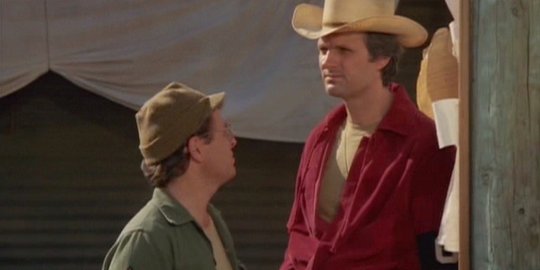
Among the various characters that appeared in M*A*S*H, Corporal Radar was arguably one of the most relatable. Being the clerk for the 4077th MASH camp, he was often given various tasks to do by different officers whether he wanted to do them or not. Due to his wimpy nature, he often caved in under pressure and the show would occasionally make fun of this aspect to his character by giving him a teddy bear and putting him in situations that exploited his feebleness.
RELATED: 10 BEST MEDICAL DRAMAS AIRING RIGHT NOW
But this was taken to an extreme in the Season 6 M*A*S*H episode “Fallen Idol” when Captain Hawkeye outright calls Radar a ninny due to him foolishly worshipping Hawkeye like an idol. While the above quote could be interpreted as funny because of its truthfulness regarding Radar’s character, the tone makes it sound nasty.
9 Klinger’s Tendency To Wear Women’s Clothing
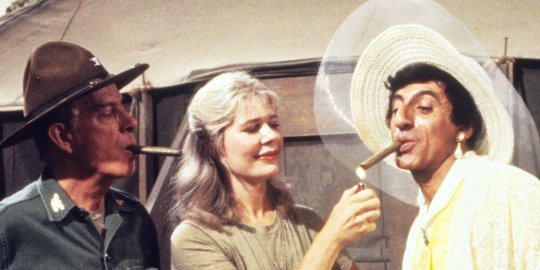
One of the longest ongoing jokes in M*A*S*H was Corporal Maxwell Klinger’s habit of wearing women’s clothes much to the annoyance of his superiors. The reason he did this was so he could get discharged under the rules of Section 8, which applied to officers that were considered mentally unfit for the military.
Now at a glance, this comes across as offensive from a modern perspective since it unintentionally makes fun of transgender people since they were often given a Section 8 discharge from the military. Then it doesn’t help that Klinger’s character was originally written to be effeminate, which the writers didn’t go through with but what they did isn’t much better.
8 “Anyone who needs psychiatry is sick in the head.”
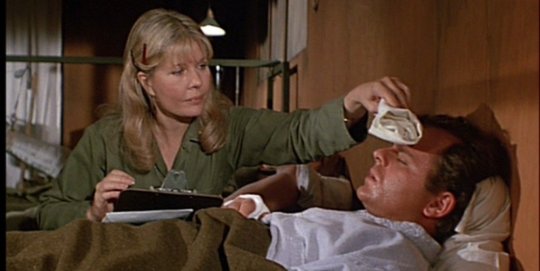
Being the cliche stick-in-the-mud military officer, Major Frank Burns served as the perfect contrast to characters like Hawkeye who were wild and didn’t play by the rules. Still, that doesn’t excuse some of the things Frank says.
Take, for example, this joke from Season 3 of M*A*S*H titled “Mad Dogs and Servicemen” which Frank remarks to a GI who is suffering from mental trauma that causes him to become paralyzed both physically and mentally. As a result, this joke comes across as offensive due to our modern understanding of mental illness which was starting to be explored more thoroughly when this show originally aired.
7 Hawkeye Being A Constant Womanizer

Another ongoing joke in M*A*S*H was Hawkeye’s tendency to get 'romantic' with any women that were available. Though this was a trait of his carried over from the original M*A*S*H movie, where he was played by Donald Sutherland instead of Alan Alda, that doesn’t make his constant flirting any less annoying or cringe-worthy from a modern perspective.
While it might have been seen as charming back when the show first aired and even funny in combination with Hawkeye’s usual witty remarks, it gets overused so many times throughout each episode. He even goes so far as to flirting with the same woman over and over again in the same episode, whether it’s an established character or a nobody with a pretty face.
6 “When did this line start using stewardesses?”
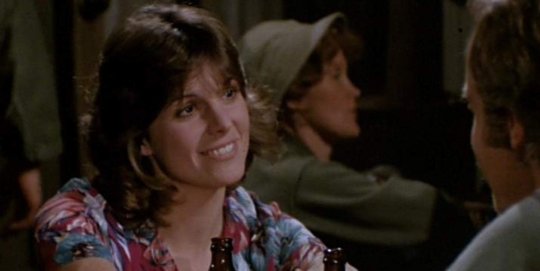
Though the 1970s brought about Second Wave Feminism, which pushed for more equality through protests than the First Wave, the entertainment industry still had a ways to catch up. For instance, while M*A*S*H did have female military officers such as Major Margaret Houlihan who mattered as characters and not just eye-candy that didn’t stop them from being the target of casual sexism from the men.
RELATED: 10 EPISODES THAT AGED BADLY FROM SEX AND THE CITY
One such example happened in the eighth season episode “War Co-Respondent” where a female war correspondent named Aggie O’Shea arrives at the 4077th MASH camp and gets greeted with this joking remark by a male officer.
5 Hawkeye And Trapper Pulling Cruel Pranks On Margaret

When Hawkeye wasn’t busy flirting with women, he and his buddy Captain Trapper would pull various pranks around the 4077th MASH camp. The two people they tended to prank on the most were Frank and Margaret. But while Frank had mostly harmless pranks done to him, like having his arm wrapped in a cast with a hook, the ones done to Margaret were arguably more cruel by comparison.
RELATED: THE OFFICE: 10 OF JIM'S MOST ICONIC PRANKS ON DWIGHT
For instance, in the Season 1 episode “Major Fred C. Dobbs” Frank requests a transfer from the 4077th MASH camp and has a private heartfelt conversation with Margaret about it. While this is going on, Hawkeye and Trapper put a microphone in the tent causing Frank and Margaret’s conversation to get broadcast to the whole camp.
4 “Shoveling a little manure for my ‘Tokyo Rose’”
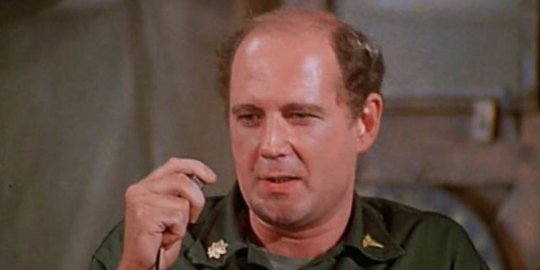
Much like Frank, Major Charles Winchester III was another straight man who served to foil Hawkeye. His main character-arc, though, was resenting his superior officer who transferred Winchester to the 4077th MASH camp after Winchester beat him at a game of Cribbage.
Then in the Season 9 episode “No Laughing Matter,” Winchester meets that superior officer again and tries to win him over as a means to get back his previous position in Tokyo. Hence, Winchester says the above line which is meant to be funny as it is a pun on the Tokyo Rose propaganda broadcasting personality from World War II. But it isn’t funny now due to the controversy surrounding this persona, which involved a Japanese woman born in America who was wrongfully accused of being the ‘real’ Tokyo Rose and convicted of treason according to the FBI’s website (though she was pardoned later).
3 Frank’s Infidelity
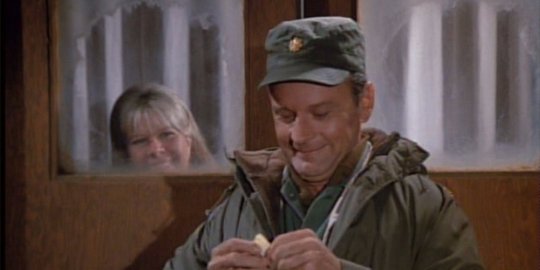
Every now and then, the M*A*S*H series would draw attention to the fact that many of its characters had loved ones waiting for them back home in the United States. One that got brought up the most frequently was Frank’s wife, due to his not-so-subtle affair with Margaret who was never consistent about whether she cared Frank was married or not.
This, in turn, was framed by the show as being funny, since Frank and Margaret pride themselves on being more dignified than the officers below their rank yet the fact that they commit infidelity made them seem like hypocrites. But it isn’t by today’s standards, since Frank comes across as an unfaithful jerk.
2 “Korean women aren’t known for hairy knuckles.”
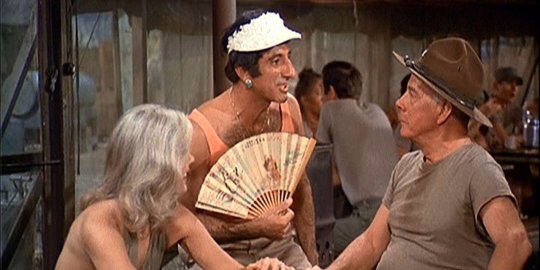
Despite the show’s reputation for being surprisingly dark despite its comedic elements, and underlying critique of the Vietnam War like the film that inspired it, M*A*S*H is sadly a product of its time. For instance, there weren’t many POC characters present. Then there weren’t many Korean characters, despite the show being set in Korea, and the show’s depiction of them was questionable.
For instance in the Season 4 episode “Dear Peggy,” which was part of a series of episodes where a character would be writing a letter to a loved one and recalling events that are portrayed in the episode proper, Klinger tries escaping the MASH camp by dressing up as a Korean but gets caught by the commanding officer Colonel Potter who says the above line. It’s meant to be funny in relation to Klinger’s poor disguise, but it comes across now as subtly racist.
1 Margaret Being Harassed And/Or Assaulted
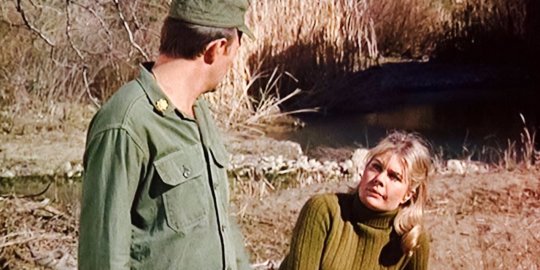
Because Margaret was the only significant female character in M*A*S*H, she was often flirted by the men in the camp regardless if they were established characters or guest ones.
Sometimes, this flirting would escalate into harassment or straight-up assault as was the case in the Season 2 episode “Operation Noselift” where Margaret gets assaulted by a plastic surgeon named Major Stanley “Stosh” Robbins who takes a fetish-like interest in her mouth thinking she’s the “Barracuda” nurse Hawkeye mentions early in the episode. Though it’s meant to play for laughs due to the misunderstanding aspect of the situation, it isn’t funny nowadays due to our modern sensibility about harassment.
NEXT: 10 QUOTES FROM M*A*S*H THAT ARE STILL HILARIOUS TODAY
source https://screenrant.com/jokes-mash-already-aged-poorly/
0 notes
Text
A monster is a person in your neighborhood: Satire vs. acceptance on Sesame Street= Netzach/Hod She b Malchut
Super-hero cartoons are arguably as rooted in gangster literature and media as they are in any epic heroic tradition. It's only very recently that there's been a move to return Star Heroes to military legitimacy, as The Avengers become an official S.H.I.E.L.D project... we'll see how long that moment lasts. Because since World War II, the super-heroes have tended strongly to be identified exclusively as private citizens, defined by, if not their hostility to government, a certain amount of government distance from them, manifest as either fear/hostility, or dependence, as in the case of Iron Man, or Superman or Batman. None of them are government stooges, or instruments, but the local or national state tends to come to them in need of help with some regularity.
The relationship between the state-- Malchuth and the heroes-- Zeer Anpin, is fraught with tension, as is the way of serious long term relationships. One is the stability, the other is the agent of justification. One just wants to serve, the other just wants to feel good, safe. Gangster literature is what, in many ways, first developed this relationship in the context of the modern city itself. The functional agency of drawing and circulating satisfaction vs. the frustrating maternal Law, defending some kind of innocence at the expense of functionality-- the end of the story is a covenant drawn between the two, making them agent facilitators of each other. It's like every good marriage, until it falls apart perish forbid. The distinction between one and the other demands mediation, and a third emerges naturally in the polarity between the two: The infant is to become the Tzaddik. Trusted somehow by all, and ultimately the most vulnerable, his/her death is the epic tragedy that lets everything fall apart.
Gangsters, like babies and deities, are folk heroes stripped of the conceit of altruism. What their most selfish values begin to describe are the truest essential concerns of any individual, and any nobility, loyalty, or pragmatic intelligence they express become relatively ennobled, and their folly is only that of the most traditional of ruined heroes: hubris, intoxication, and foolish obliviousness to the consequence of their failed confidence. Scarface dies much like Achilles and Balder, once they've climbed to the top of the world to become the most beloved and feared of the gods, a war god and a sun god all at once-- that's when it's over. A failed hero is the beginning of all cautionary example.
What is Count Dracula if not another of these failed heroes, but cursed with unending success? See the ultimate horror of Dracula in the later films-- frustrated by the nature of what he is, yearning so great that satisfaction and victory cannot satisfy? The vampire hero, redeemed, must overcome even the yearning for satisfaction in order to become profoundly trustworthy. You'll observe, this is also the lesson that creates Spider-man, Thor, Hulk, Iron Man, Wolverine, and many other Marvel heroes: only by giving up on personal satisfaction, be it in the form of love, revenge, wealth, or even divinity-- can they become what's trusted as a hero, and then they can overpower anything and everything, even death itself.
Frank Miller's neo-pulp heroes in Sin City take this a step further, rejecting even the appearance of even nobility itself in order to be heroes, and Chris Nolan's Batman is very influenced by Miller's version of gritty austere virtue-beyond-beauty. Here is the point where a Pop/super-hero remains distinct: he does not have to ever, give up his integrity. Pulp heroes, later day post modern comic icons, like John Constantine, Wolverine or any of the Warren Ellis Authority indy heroes outside of the mainstream mold. Their virtue is, partially, willingness to step past even needing to feel whole about their actions in order to do what needs doing. This is why Garth Ennis ultimately prefers to write war comics: that pragmatism is taken as a given, and the super heroic idealism is understood as a decadent privilege, at best.
Super-heroism rages, by it's nature against this criticism. This is most overtly expressed in Joe Kelly's Superman vs. the Elite storyline, notably adapted to animation in 2012. Don't call it naïve, don't call it juvenile-- call it simple, elementary, iconic. The hope of approaching moral depth and the implied darkness accepted in that is more resonant and literary, but betrays the purity that the heart yearns for from it's mythology. Maybe i'm exaggerating-- traditional religion and mythology tends to accept, even embrace, moral relativism and the challenge of dark nature and betrayal of ideals as a certain form of ideal-- but as civilization becomes more sophisticated and self aware, the antidote demands to be more pure, hence the progressively more senseless and emotionally immature nature of super-modern pop music, during any era that should be finding depth and collective appreciation of that capacity to acknowledge the disturbing range of what's clear about being a person, all the more so does the simplest, most even offensively naïve of narratives become resonant. Witness the victory of Christianity over both Roman paganism, Norse Aesir worship and folk Gnosticism-- why did the cruelest of all empires go with the religion that ultimately, theologically, justified its excesses the least? Because they needed the purest of purification to move on and be the kind of bad they were going to become from then on, in order to rule themselves all.
This is the degree to which satirical anti-heroes are central to the maturity of a culture. But once satirized effectively enough they can no longer be national icons-- they must either respond to the satire, and become better and more whole mythic heroes, like Krishna after Buddha, or Elijah after The New Testament critique of his fiery piety in the tale of the good samaritan. The choice becomes ironic pandering, ignoring the critique in search of more naïve audience, or better yet, some sophisticated refinement of character, and ideally a mythic defeat of the criticism. In this, the hero's ideals themselves defeat the villain embodying the critique. This is much of where the Batman vs. Joker conflict has gone in recent super-modernity, where Batman's commitment to protecting, or at least not killing, the monstrous grizzly and willfully chaotic murderer is justified as an ideological triumph-- not defined as a virtue by dint of dated calvinist “commitment to ideal”-- because no one respects that kind of ideological commitment as being authentically virtuous anymore. The triumph instead has been defined in specific contrast to the Joker's preference-- the Joker would like Batman to kill him, ostensibly, because that would prove the virtue of killing problems, and by NOT killing him, Batman proves his virtue and commitment to the legal process, in some strange sense, which strips batman of the danger of being a social terror.
The real reason for this hang-up is much more narratively practical-- the villain is too precious to kill off. The Joker, like almost every other villain of grace and note, is divinized by his meaningfulness. He was actually killed off in his second appearance, but to no avail-- the editors commanded the writers to find a way to bring him back to life only a short time later, and so it has been his practice ever since, much like Dracula or Moriarty.
The degree to which villains are different than monsters is the degree to which there is no reward in slaying villains-- only an end to the great narrative. Monsters, on the other hand, must be slain, as this is the original sin of demonization-- insisting that violent annihilation is the only solution to the needs of another “human.” A villain is preferred to be captured, and maintained in controlled captivity. This mystic clarity about the reincarnation of the slain enemy into distant freedom, as opposed to the power of sacred captivity, to keep one's enemy close, accessible, and monitored, like the very id itself. As indestructible and precious as the self itself, the moral of the story is Overcome, but never destroy.
Dracula's special and refined thirst is for the Moon, the untouched mother-- and his slave wife is the Venus, although the point where they meet is close. The early evening- But Venus is his weapon, while the Moon, ultimately, is his weakness, what gets him killed, even as much as he lives from nursing at it's behest and it's throat. This is the secret of the two “ה"'s in the four letter tetragrammaton “YHWH”.
One of the profound psychological innovations of Sesame Street is to reclaim the monstrous as synonymous with the human, thus overcoming at the most viceral and accesible level untold generations of demonization. Where traditionally Dracula and all the monsters represent the repressed and feared aspects of basic hungry humanity (“hell is other people”) Sesame Street takes Dracula and reframes his hunger as simple passion for the abstract and inherently unlimited satisfaction of numbers themselves. Whereas Count Dracula himself is the first amongst modern pop-monsters, The Count falls parralel to the sephira of Hod, sensetivity and co-dependance, the aspect of the god who gives numbers to the stars already created, unthreatening, although perhaps slightly nagging tho graceful and charming. Contrast this with the muppet I would consider his opposite number in rank and value, the Cookie Monster, who I would consider an expression of Netzach/Dominance, his hunger unavoidable and creepingly inquisitive, his pallette insatiable although still somehow respectful of some kind of engagement and personal limit in the context of personal need, reflected in his rectification as a vegetable eater who just appreciates the cookies as a “sometimes food,” even as his monstrous appetite remains intact. The villification of Venus/Innana is that of an insatiable lover who does not care much at all, but cannot long be resisted, or even resented, as the defeated visage of Ernie-without-cookies testifies.
A monster is just another person in the neighborhood; a reflection of our own normal needs and hungers, respected, honored, and safely sociably satisfied. Grouches and Satyrs are just themselves, and honored for and despite this-- what more radical message can civilization aspire to offer? This is, ultimately the great difference between Babylonia and Egypt: Egypt sought not (generally) to assimilate it's monsters and enemies, although there were periods where the Sethian was more integrated-- the foreign was somewhat inherently anathema-- and this nativist impulse endured until the Greeks overcame it, as was the nature of Greeks, to overcome nativisms with a glorious and all-consuming universalism. Rome's innovation was just to weaponize the Greek syncretic clarity, and apply it more aggressively, taking it's perfection for granted as much as was reliable. Once, to end wars within an empire, polytheistic pantheons were assembled, as a kind of a symbolic senate of the different priorities of different city-states within an empire. Egypt may have innovated this, if Babylon did not, it doesn't matter. Babylon's aspiration was not just to be an empire, but to be a great city, where things worked-- and it became clear that unless there was co-identification, and cathartic expression, of the different elements within their society, there would be conflict. The great Babylonian epic of Gilgamesh reflects this ambivalence, between the slaying of monsters and their integration and the acknowledgement of their humanity. The hero starts the story as a hated villain, an oppressive king resented by the populace he rules. A hero from outside of civilization comes to confront and slay him, this force of cruel and selfish modernity-- but instead, thanks to the intervention of certain gods, they become friends instead, and go on an adventure to slay another more monstrous monster. This conflict is greatly debated and engaged, before and after, and leads to conflict with greater forces, goddess and her pet cosmic bull. Our heroes slay the cosmic bull, and for this, one of them must die. A similar narrative is kept by the Greeks, when Kadmos slays the wrong dragon, the beloved of Hera, and so must lose his beloved sister Europa, forever. The moral is clear-- the more you can integrate, and not kill, the less threatened you will be. This is the purest moral of all civilization.
Sesame Street is in the unique summit between commercial and civil. Concieved, unlike most pop-cartoons, not for profit but for some kind of educational, civic or edifying purpose, specifically bound up in the grand project of universal education for all children, its excesses as far as violence and indulgence of children's affection for sugar and noise compel parental forgiveness and toleration, in light of the hope that the kids would enjoy this educational pop-media over less trustworthy and more commercially pandering tv shows. In it's early episodes, it could get away with a lot as far as puppet violence and questionable exploration of tantalization and titillation of kindergardeners, as it at least had positive tacit integrationist and educational function, about the nature and character of assorted letters and numbers(!). Once Sesame Street became established and somewhat universally successful, and thus, functionally institutionalized, it also became more sensitive to moral criticism, and able to be overtly responsible for the values and graces it would introduce, rather than assume were already part of children's paradigma. Cookie Monster introduces children to consumption, rather than just satirizing a hunger already observed, and becomes a certain kind of role model, now responsible to amend his own nature, so that the lesson of moral clarification become the implied arc of his journey, even as older episodes exist only in archive, except of course for classic routines, which are continually re-integrated into new episodes. The earliest Ernie and Bert routines remain in circulation and translation forever, because they are so fundamental and accessible-- a good omen for pop-longevity. Many classic figures are integrated into Sesame Street, but eventually used less and less because what they meant historically becomes less and less relevant. I was introduced to the character of Charlie Chaplin's “Tramp” in the context of Sesame Street, but they don't use even the Maria who played him so much anymore. Instead, is Mr. Noodles, the incompetent mime in Elmo's world who children joyfully correct as he manically tries to complete the most rudimentary of tasks, to no avail, until the advice of a quorum of offscreen children are able to get through to him, with the help of Elmo's omniscient voice. Elmo is the aspect of Malchus, in that he became the main character of Sesame Street, despite being a later addition to the cast. He is a monster child, like the once central Grover, but unlike Grover or Chaplin, he is defined by his absolute competence. His lessons are those learned after doing everything right, not wrong. He is the aspect of the wise child, not the fool, and so he is given an entire third of every episode of the final few seasons of Sesame Street-- until he himself, that is, the actor who played Elmo exclusively, was implicated in the hubris of the successful, and the good name of all that Elmo and Sesame Street are associated with became suddenly embedded in sexual impropriety. Such is the downfall of kings, specifically: fear of their appetites and preferences, because of their absolute power.
Sesame Street is too big to end because of an underage gay sex scandal or two, but not too big to need to be a bit castrated because of it. Pop-cartoons depend on grace, and the impression of trustworthiness
before both parents and children. As cool as we all want to be with what actors do on their own time, it was a bit more of a problem with Sesame Street, because the actors, especially in the case of Elmo, are so deeply and truly associated with the show itself. Not since Jim Henson himself was alive and available to make Kermit the Frog a celebrity, available for interview and all manner of guest appearance, was a character so genuinely and improvisably identifiable with the actor giving him voice.
It's not that “we” found out that Elmo himself was a chubby older black man with a thing for 17 year old men, it's that Elmo is such a naked expression of erotic power male power, easily identifiable as kind of Libyan Satyr; a naked, red wildman. Identifying THAT cartoon Id with an actual person, might just be a little hard to reconcile for long. So they appear to be phasing him out a bit, making the Elmo's world segments less personal and more theatrical, so that the distance of seeing him as more of a stage muppet that an intimate and eponymous pop force, like the great god Pan himself, kept alive only in Elizabethean chains, taken from the wild forest onto the city stage. A smaller King Kong is a loveable King Kong, unless and until he creeps you out. Then what're you gonna do?
The Sesame Muppets are monsters of the greatest virtue. They will not eat you, and don't even have to promise not to; the question dare not come up. They want to share and play responsibly, learn and help us learn. In this, they are a tikkun on the respective terrors and traditional issues with their respective forms. The Great Eagle, the “Big Bird,” hangs over looking patronizingly down for prey-- but Big Bird on Sesame Street is utterly without guile or threat, taking as much responsibility for whatever goes on as is possible, in his dreamy ignorance. This is the level of the great dove, divinity herself, rather than the predatory eagle or trickster raven-- the hawk coming to bring things to you, rather that to eat the eyes out of your head. Dracula is reduced to counting passionately only numbers and not bride-victims. The unconquerable hunger behind Dracula, the oceanic kraken come asurface, hungers only for cookies. Grover is something tragic, a hero partially defined by his constant failure. Through him, children learn the grace in not being good at something, and still trying because you care, and the effort is cute. But Elmo informs of the possibility of being inherently right at everything, and STILL being cute, and this is the different between the Messiah of Joseph and the Messiah of David. This is one of the strongest subplots in the old testament, and endures through the entire post Pentateuch bible, when the kingdoms of David and Ephraim (Joseph's son) literally split because of conflicting priorities. Modern scholarship identifies these two voices as representing conflicting political priorities involved in the bible's construction, Kabbalistic tradition prefers to assume that it's an internal expression of fundamentally complementary models. Joseph, identified with the sphere of Yesod, is identified with unyielding righteousness, and keeping of rules. He must die and fail at some point, if not in every generation, to make the point of the limitation of perfection in this world. The Davidic model, introduced in his forefather Judah, for whom the Jews are named, is about the triumph of earnest imperfection, bound up in a will to constantly do better, in a manner unbound by law or principle, although still beholden to the purpose and meaning of law and principle, and whose life, triumph and clarity can only come after being built by adherence to law and principle. The Davidic Messiah is the one who brings clarity to true purpose and divinity into the already formed Josephean structure. As such, he never dies, and cannot fail, but can only be disgraced into some degree of dismissal, as was the way with Elmo and King Solomon.
2 notes
·
View notes
Note
Hello there! First I just wanted to say how much I appreciate the work you're doing and the amazing dedication, I'm incredibly grateful to you. I hope you could help me with a little curiosity about dwarves military organization. You think they would train for war together and maybe start before they are battle ready? There would be a military academy or something like that? And would they have ranks?(Sorry if you already answered this questions) I wish you a great day, thank you again
Well met and thank you for those kind words Anon.
I personally believe military training schools (or academies if you like) would have been present in every dwarvish hall large enough to support one.
My logic behind this is this….
Firstly, we know that during the Battle of Azanulbizar (T.A. 2799), the final battle in the War of the Dwarves and Orcs, Dain Ironfoot hewed off Azog’s head before the doors of the East-Gate. We also know that dwarves are physically adult at the age of 40 (HoME), yet Dain Ironfoot was only thirty-two at the time, hence one can understand clearly why this act was heralded as a magnificent feat, especially for one so young.
Though dwarves (and Dain in particular) are know for their great strength, it is hard to believe that Dain would have had little or no training and yet managed to accomplish such a feat.
Furthermore, we know from The Lord of the Rings, Appendix A, “Durin’s Folk” that Gloín (Gimli’s father) was also present at the Battle of Azanulbizar, yet he was even younger than Dain, only sixteen at the time. Though we can assume it would not have been the norm of using dwarves so young in their battles, we know that Gloín was there and very likely took part in the battle.
So, considering the importance of this particular battle it was possible that even those in training (which Gloín likely would have been at that tender age) were summoned to battle. This, even more than Dain being at this battle, leads me to believe that dwarves started to train their sons in the art of warfare from a very early age (as soon as they were no longer considered children in fact).
Now, it is often easy to forget that a dwarvish “sixteen-year-old” or “thirty-two-year-old” do not equal a mannish “sixteen-year-old” or “thirty-two-year-old”. For dwarves these are both still teenagers, one a very young teenager, while the other one nearing physical adulthood.

I’ve added a graph of age comparison between men and dwarves (from a file I once made but never finished - it is on my todo list to finish, I promise), based on all we know from Tolkien’s writings. So it seems logical that between the age of 15 and 30 dwarves would have been trained in the use of axes, swords and overall battle tactics and could be called to war. Not only does this fit with what Tolkien wrote, but it also fits with real life cultures that were often used as inspiration for Tolkien’s dwarves; to become a warrior among the Vikings for instance one could be as young as 12 years old. Similar accounts can be found among the ancient Israelites (the jews often being a source for Tolkien’s dwarves).
Now, concerning your second question, about ranks. We know only of one rank clearly, which is that of Uzbad (”Lord”), though considering the organisation of dwarves in battle other ranks would seem not only logical but very much required. To determine if there would have been other ranks we need to look at their military structure in a bit more detail. We know for instance that Dain Ironfoot lead 500 soldiers into the Battle of Five Armies.
500 soldiers is a pretty standard number in many cultures when it comes to dividing a large force into smaller tactical units. The Roman Cohort for instance was roughly 500 soldiers too, 10 of them making up a legion. If we look at cultures (like the Romans) that used a division of 500 soldiers we can quickly get an idea of the different ranks involved. Most seem to divide such a division into 5 to 10 smaller groups, that were commanded by one - who in turn was assisted by one or two other officers (lieutenants and sergeants).
Taking some liberties with the above something like this could have been a possibility among the dwarves.

The Army of Dain Ironfoot as seen in The Hobbit: The Battle of The Five Armies (all rights reserved)- those lads seem like a lot more than 500 dwarves if you ask me.
Army divisions:
‘azghakkâ’ (“war-force”) - army (all troops under the command of an Uzbad)
gangbuh (”march-company”) - regiment - a force consisting of 10 maznakkâ.
maznakkâ’ (”fist-force”) smallest military company consisting of usually 49 dwarves (seven being such an important number with the dwarves it seemed logical to group their smallest division with 7 in mind - or in this case 7 x 7) - each maznakkâ could consist of different units of seven dwarves, these could be engineers, foot-soldiers, elite forces, archers, and/or logistical personnel.
Ranks:
Uzbad - Lord - Commands the ‘azghakkâ.
’Azghzabad - Warlord - Right hand of the Uzbad, main tactician in matters of war.
Fabarâl - General - (“forward-mover”) - Commands each gangbuh (about 500 soldiers)
‘Uzkhas - Commander - (”greater lieutenant”) - First in command of a maznakkâ’
‘Izkhas - Lieutenant - (”lesser lieutenant”) - Second in command of a maznakkâ’
Dumul - Soldier - (“from the halls”) - Soldier who has experience in battle or deemed worthy to fight in the vanguard.
Idmul - Recruit - Soldier who is new to battle, or still in training, more frequent in the rearguard.
Other military terminology:
'Azaghâl - person who, by profession, is a soldier, warrior or private soldier (covers both “dumul” and “idmul”) - note: also the epithet of a Broadbeam King of old who died in battle.
Zabad - an officer (from ‘Izkhas to Uzbad)
Dahâl - person who, by profession, travels with a military regiment and supplies food and all matter of provisions
Barâl - person who, by profession, is a member of an elite military regiment that fights in the vanguard to break open the front lines of the enemy
'Udshankhuzd - dwarf (about to reach battle ready age) who is the personal assistant to a lord, general or army commander, often carries messages and weapons or armour on his behalf (like a squire)
'Idshankhuzd - dwarf boy or girl (before battle ready age) who is in service of a general or army commander, usually doing household work (like a page) - remains in the Hall and does not join in campaigns.
Rimi - part of an army set to cover its rear ranks, especially in retreat (rearguard)
Ifbaragash - foremost rank of an army (van, vanguard)
I hope that answers your question Anon.
Ever at your service,
The Dwarrow Scholar
142 notes
·
View notes
Text
APC: The Obstinate Journey to Shame via London – Pius Adesanmi
Those interested in the dustbin of Nigeria’s history will one day find APC inside the rubble, among the putrefaction, just beside PDP, and bring out her carcass for examination.
Such students of the dustbin of history will likely conclude that APC’s signature contribution to the Nigerian tragedy is not in the empirical failure to deliver on measurable electoral promises in virtually all areas of national life but in the deadening of the Nigerian mind.
A nation’s mind is lost when the capacity for ironic sentence dies. And no group of Nigerians, at any moment in our chequered national history, has contributed more to the assassination of irony than the Confederacy of parochial interests in the leadership of APC.
If blindness to irony stopped within the ranks of APC’s leadership, if it was limited to Governors, Senators, Reps, and other political figures within her ranks, I wouldn’t be so worried. It would be their funeral. I am not in the habit of shedding tears for members of Nigeria’s political elite over their intellectual impecuniosity.
My worry lies in how the leadership of APC has democratized blindness to irony, especially among their followers so effectively. If irony hits you like a Dangote truck and you are unable to recognize it as a citizen, you wear that condition of ignorance like a badge of honour and hit social media for celebration in this APC era.
Chief John Odigie Oyegun fired the first bullet to assassinate irony. APC had just won the election. She was still in that period of grace when the people could excuse anything. Euphoria was still in the air. One message of change that APC could send early and effectively in order to write her name in gold was in the retirement of campaign funds.
The notion of retiring campaign funds is a complete stranger in Nigeria. We have at least two adult generations who have never heard of it because it has simply never been practiced. No Nigerian has ever retired campaign funds. After elections, you privatize the leftover funds, campaign vehicles, and other resources. You keep everything for yourself and distribute some to your cronies. This, of course, is a crime routinely committed by every Nigerian who has ever run for public office: There is no separation between their bank accounts and campaign contributions.
President Buhari, especially, most especially, had a moral and ethical obligation to inaugurate a monumental paradigm shift in our policy by being the first politician to ever retire his campaign funds, especially after making such a show of seeking a loan for the nomination form. He lost that golden opportunity to inscribe his name in gold – as he has frittered away every other opportunity since his election. To this day, President Buhari’s campaign funds have not been retired.
Enter Chief Odigie Oyegun with an early press interview. APC, he assured the nation, was not the party that should retire campaign funds. The onus, he continued, was on PDP to retire her campaign funds. I gasped and nearly had a heart attack when I read such ignorant comments from the Chairman of the President’s party. To this day, Chief Oyegun has not explained the sources of his sick political theory of campaign finance retirement to Nigerians.
The irony was supremely lost on Chief Oyegun and APC. They had campaigned on a mantra of change but were telling Nigerians that the change ought to start with the party they had vanquished! Did PDP promise change? This was the beginning of a history of criminal blindness to the irony that has led APC to the dustbin of history.
More tragedy was to come from APC. The party promised financial prudence and frugality. President Buhari held on to the most visible evidence of the long history of financial irresponsibility by the Nigerian Presidency – the harem of presidential jets. No change here. The irony was supremely lost on the changers.
President Jonathan was a junketing President. He traveled the world so irresponsibly that Reuben Abati was forced to pen a funny piece on the gains of President Jonathan’s foreign trips. However, Reuben could not possibly have believed the nonsensical claims he was making in that essay.
Did President Buhari change the paradigm of fruitless and irresponsible presidential trips? For where? He doubled down on it, determined to cover in a few months the air miles that Jonathan covered in five years. But for the unfortunate illness that has largely truncated his trips, President Buhari was approaching a point where he could very much have offered to build an airport for a country without an airport in order to be able to visit such a country. No change here. The irony was supremely lost on the changers.
Fast forward. Roll over two years of daily evidence of blindness to irony on the part of APC and you arrive at restructuring. Suddenly, APC has a committee led by my friend, Nasir El Rufai, whose mandate is to help her understand restructuring and frame her position accordingly. APC’s entire electoral manifesto is a promise of restructuring by other names. They called restructuring all sorts of names in various parts of that document but they cannot possibly pretend not to know that restructuring is what they promised. In some places, they called it devolution. In other places, they used other names but it all still comes down to the fundamentals of restructuring: empowering the margins, de-centering the centre, putting an end to Nigeria’s obnoxious financial feeding bottleism from the centre.
All of a sudden, nobody in APC has ever heard of restructuring. They now need a committee to study it, help them understand it, and, Allah be praised, the committee just must comprise all the Governors in their ranks who have declared war on restructuring recently one way or the other! No change here. The irony was supremely lost on the changers.
The most difficult part of APC’s tragedy is the part of their manifesto and agendas pertaining to health and health care delivery in Nigeria. Nigeria would become the Dubai of health facilities within five years and progress on the road to Dubai would start to become noticeable within the first two years. You must, of course, read APC’s manifesto on health in tandem with President Buhari’s campaign statements vigorously condemning foreign medical safaris.
All of these promises have led to the sorry and tragic spectacle of APC Governors and the Party Chairman at a medical safari breakfast table in London. During President Buhari’s first stint in London, it had been the entire leadership of the National Assembly. It is painful to see what these leaders are doing to themselves. I take no pleasure in watching their naked dance in the marketplace. At various times, the President of Nigeria, the Senate President of Nigeria, the Speaker, Governors, and the Acting President of Nigeria have all gathered in London. No sense of shame. No trace of the understanding of irony in their demeanor.
I wager that they are doing it because there is a sense that they have so battered and clobbered the people into intellectual submission that the ability to engage and vigorously examine the empty ethical and moral proposition of their actions is no longer available in the land. I wager that they are doing this because their spokespersons, supporters, and foot soldiers have so battered and clobbered the people into submission and silence that nobody is going to even dare to ask: who funded APC’s Jamboree to London?
I wager that these Governors are going to say that the London trip is a working visit, hence the deployment of public funds on such a woolly-headed Jamboree at a time when, from Lagos to Port Harcourt and everywhere, Nigeria is showing the world a spectacle of flooding and salaries are not paid. If the Governors considered this trip to London a working visit and expended public funds on it – I suspect they did – this would be another tragic nail in the coffin of the changers.
From the same political party, the Acting President made a cameo appearance in London a few weeks ago, assured the nation that the President was in great condition and was primed to return to the country very soon. If we are to believe a Pastor of the Redeemed Church, what could have been so urgent that the APC Governors couldn’t wait for the President’s arrival? Could it be that they did not believe the reassurances of the Acting President?
Whatever be the case, this London trip is a tragedy on so many fronts. On that medical safari, breakfast table was assembled those who promised to change the paradigm by putting an end to medical tourism. The supreme irony was lost on them.
Also lost on them is another supreme irony – and this one is a tragedy for Nigeria. Wait for it: the only two instances of leadership by example on the issue of foreign medical trips that we have come to us from the cancerous stables of PDP. Idris Wada is one of Kogi’s worst Governors. He was also very accident prone. He never went beyond Abuja for his medical woes. All the broken bones he sustained from his many convoy accidents were treated in Nigeria. And His Excellency Chief Otunba Dr. Peter Ayodele Fayose (Jerusalem Pilgrim) has been doing a lot of chest beating about his own medicals in Nigeria.
Wada and Fayose as the best examples of the change promised by APC? Nothing makes sense anymore. APC has turned Nigeria into a Yeats-Ville where:
“The best lack all conviction, while the worst Are full of passionate intensity.”
When the best lack all conviction and, blind to irony, fly off to London to waste public funds in defiance of the very principles they swore to uphold, you can see the worst running riot all over the land (Fayose, FFK, etc) with passionate intensity.
Yet, the irony is lost on the changers.
And their followers. And their defenders.
The post APC: The Obstinate Journey to Shame via London – Pius Adesanmi appeared first on Newsflash247.
from WordPress http://ift.tt/2vVtQKx
0 notes
Text
10 Jokes From M*A*S*H That Have Already Aged Poorly | ScreenRant
Based on the book and movie of the same name, M*A*S*H was a hit television series in the 1970s that surpassed the movie’s fame, much like Stargate SG-1 did compared to the original Stargate movie. Set during the Korean War, the show focused on the antics of the fictional 4077th Mobile Army Surgical Hospital of the United States Army stationed in South Korea.
While the show was mainly known for its comedy, it also tackled serious subjects. With that said, not all of the jokes from M*A*S*H have aged well to this day.
RELATED: FRIENDS: 10 JOKES THAT HAVE ALREADY AGED POORLY
10 “Stop it, will ya!? You ninny!”
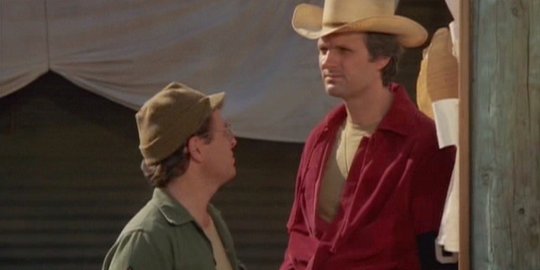
Among the various characters that appeared in M*A*S*H, Corporal Radar was arguably one of the most relatable. Being the clerk for the 4077th MASH camp, he was often given various tasks to do by different officers whether he wanted to do them or not. Due to his wimpy nature, he often caved in under pressure and the show would occasionally make fun of this aspect to his character by giving him a teddy bear and putting him in situations that exploited his feebleness.
RELATED: 10 BEST MEDICAL DRAMAS AIRING RIGHT NOW
But this was taken to an extreme in the Season 6 M*A*S*H episode “Fallen Idol” when Captain Hawkeye outright calls Radar a ninny due to him foolishly worshipping Hawkeye like an idol. While the above quote could be interpreted as funny because of its truthfulness regarding Radar’s character, the tone makes it sound nasty.
9 Klinger’s Tendency To Wear Women’s Clothing
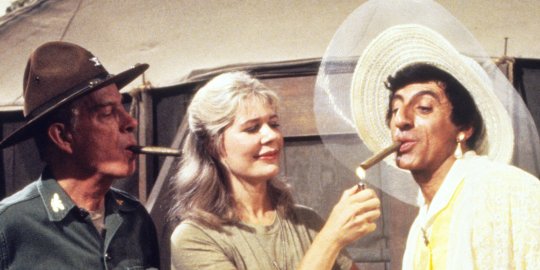
One of the longest ongoing jokes in M*A*S*H was Corporal Maxwell Klinger’s habit of wearing women’s clothes much to the annoyance of his superiors. The reason he did this was so he could get discharged under the rules of Section 8, which applied to officers that were considered mentally unfit for the military.
Now at a glance, this comes across as offensive from a modern perspective since it unintentionally makes fun of transgender people since they were often given a Section 8 discharge from the military. Then it doesn’t help that Klinger’s character was originally written to be effeminate, which the writers didn’t go through with but what they did isn’t much better.
8 “Anyone who needs psychiatry is sick in the head.”

Being the cliche stick-in-the-mud military officer, Major Frank Burns served as the perfect contrast to characters like Hawkeye who were wild and didn’t play by the rules. Still, that doesn’t excuse some of the things Frank says.
Take, for example, this joke from Season 3 of M*A*S*H titled “Mad Dogs and Servicemen” which Frank remarks to a GI who is suffering from mental trauma that causes him to become paralyzed both physically and mentally. As a result, this joke comes across as offensive due to our modern understanding of mental illness which was starting to be explored more thoroughly when this show originally aired.
7 Hawkeye Being A Constant Womanizer
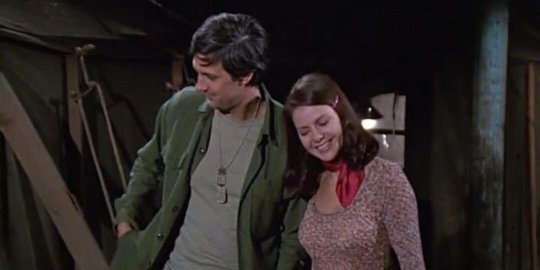
Another ongoing joke in M*A*S*H was Hawkeye’s tendency to get 'romantic' with any women that were available. Though this was a trait of his carried over from the original M*A*S*H movie, where he was played by Donald Sutherland instead of Alan Alda, that doesn’t make his constant flirting any less annoying or cringe-worthy from a modern perspective.
While it might have been seen as charming back when the show first aired and even funny in combination with Hawkeye’s usual witty remarks, it gets overused so many times throughout each episode. He even goes so far as to flirting with the same woman over and over again in the same episode, whether it’s an established character or a nobody with a pretty face.
6 “When did this line start using stewardesses?”

Though the 1970s brought about Second Wave Feminism, which pushed for more equality through protests than the First Wave, the entertainment industry still had a ways to catch up. For instance, while M*A*S*H did have female military officers such as Major Margaret Houlihan who mattered as characters and not just eye-candy that didn’t stop them from being the target of casual sexism from the men.
RELATED: 10 EPISODES THAT AGED BADLY FROM SEX AND THE CITY
One such example happened in the eighth season episode “War Co-Respondent” where a female war correspondent named Aggie O’Shea arrives at the 4077th MASH camp and gets greeted with this joking remark by a male officer.
5 Hawkeye And Trapper Pulling Cruel Pranks On Margaret
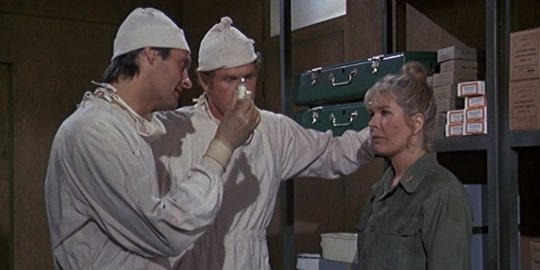
When Hawkeye wasn’t busy flirting with women, he and his buddy Captain Trapper would pull various pranks around the 4077th MASH camp. The two people they tended to prank on the most were Frank and Margaret. But while Frank had mostly harmless pranks done to him, like having his arm wrapped in a cast with a hook, the ones done to Margaret were arguably more cruel by comparison.
RELATED: THE OFFICE: 10 OF JIM'S MOST ICONIC PRANKS ON DWIGHT
For instance, in the Season 1 episode “Major Fred C. Dobbs” Frank requests a transfer from the 4077th MASH camp and has a private heartfelt conversation with Margaret about it. While this is going on, Hawkeye and Trapper put a microphone in the tent causing Frank and Margaret’s conversation to get broadcast to the whole camp.
4 “Shoveling a little manure for my ‘Tokyo Rose’”
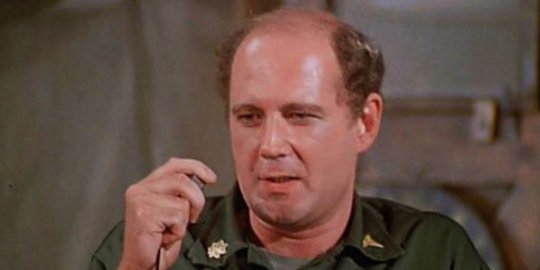
Much like Frank, Major Charles Winchester III was another straight man who served to foil Hawkeye. His main character-arc, though, was resenting his superior officer who transferred Winchester to the 4077th MASH camp after Winchester beat him at a game of Cribbage.
Then in the Season 9 episode “No Laughing Matter,” Winchester meets that superior officer again and tries to win him over as a means to get back his previous position in Tokyo. Hence, Winchester says the above line which is meant to be funny as it is a pun on the Tokyo Rose propaganda broadcasting personality from World War II. But it isn’t funny now due to the controversy surrounding this persona, which involved a Japanese woman born in America who was wrongfully accused of being the ‘real’ Tokyo Rose and convicted of treason according to the FBI’s website (though she was pardoned later).
3 Frank’s Infidelity

Every now and then, the M*A*S*H series would draw attention to the fact that many of its characters had loved ones waiting for them back home in the United States. One that got brought up the most frequently was Frank’s wife, due to his not-so-subtle affair with Margaret who was never consistent about whether she cared Frank was married or not.
This, in turn, was framed by the show as being funny, since Frank and Margaret pride themselves on being more dignified than the officers below their rank yet the fact that they commit infidelity made them seem like hypocrites. But it isn’t by today’s standards, since Frank comes across as an unfaithful jerk.
2 “Korean women aren’t known for hairy knuckles.”

Despite the show’s reputation for being surprisingly dark despite its comedic elements, and underlying critique of the Vietnam War like the film that inspired it, M*A*S*H is sadly a product of its time. For instance, there weren’t many POC characters present. Then there weren’t many Korean characters, despite the show being set in Korea, and the show’s depiction of them was questionable.
For instance in the Season 4 episode “Dear Peggy,” which was part of a series of episodes where a character would be writing a letter to a loved one and recalling events that are portrayed in the episode proper, Klinger tries escaping the MASH camp by dressing up as a Korean but gets caught by the commanding officer Colonel Potter who says the above line. It’s meant to be funny in relation to Klinger’s poor disguise, but it comes across now as subtly racist.
1 Margaret Being Harassed And/Or Assaulted

Because Margaret was the only significant female character in M*A*S*H, she was often flirted by the men in the camp regardless if they were established characters or guest ones.
Sometimes, this flirting would escalate into harassment or straight-up assault as was the case in the Season 2 episode “Operation Noselift” where Margaret gets assaulted by a plastic surgeon named Major Stanley “Stosh” Robbins who takes a fetish-like interest in her mouth thinking she’s the “Barracuda” nurse Hawkeye mentions early in the episode. Though it’s meant to play for laughs due to the misunderstanding aspect of the situation, it isn’t funny nowadays due to our modern sensibility about harassment.
NEXT: 10 QUOTES FROM M*A*S*H THAT ARE STILL HILARIOUS TODAY
source https://screenrant.com/jokes-mash-already-aged-poorly/
0 notes
Text
APC: The Obstinate Journey to Shame via London – Pius Adesanmi
Those interested in the dustbin of Nigeria’s history will one day find APC inside the rubble, among the putrefaction, just beside PDP, and bring out her carcass for examination.
Such students of the dustbin of history will likely conclude that APC’s signature contribution to the Nigerian tragedy is not in the empirical failure to deliver on measurable electoral promises in virtually all areas of national life but in the deadening of the Nigerian mind.
A nation’s mind is lost when the capacity for ironic sentence dies. And no group of Nigerians, at any moment in our chequered national history, has contributed more to the assassination of irony than the Confederacy of parochial interests in the leadership of APC.
If blindness to irony stopped within the ranks of APC’s leadership, if it was limited to Governors, Senators, Reps, and other political figures within her ranks, I wouldn’t be so worried. It would be their funeral. I am not in the habit of shedding tears for members of Nigeria’s political elite over their intellectual impecuniosity.
My worry lies in how the leadership of APC has democratized blindness to irony, especially among their followers so effectively. If irony hits you like a Dangote truck and you are unable to recognize it as a citizen, you wear that condition of ignorance like a badge of honour and hit social media for celebration in this APC era.
Chief John Odigie Oyegun fired the first bullet to assassinate irony. APC had just won the election. She was still in that period of grace when the people could excuse anything. Euphoria was still in the air. One message of change that APC could send early and effectively in order to write her name in gold was in the retirement of campaign funds.
The notion of retiring campaign funds is a complete stranger in Nigeria. We have at least two adult generations who have never heard of it because it has simply never been practiced. No Nigerian has ever retired campaign funds. After elections, you privatize the leftover funds, campaign vehicles, and other resources. You keep everything for yourself and distribute some to your cronies. This, of course, is a crime routinely committed by every Nigerian who has ever run for public office: There is no separation between their bank accounts and campaign contributions.
President Buhari, especially, most especially, had a moral and ethical obligation to inaugurate a monumental paradigm shift in our policy by being the first politician to ever retire his campaign funds, especially after making such a show of seeking a loan for the nomination form. He lost that golden opportunity to inscribe his name in gold – as he has frittered away every other opportunity since his election. To this day, President Buhari’s campaign funds have not been retired.
Enter Chief Odigie Oyegun with an early press interview. APC, he assured the nation, was not the party that should retire campaign funds. The onus, he continued, was on PDP to retire her campaign funds. I gasped and nearly had a heart attack when I read such ignorant comments from the Chairman of the President’s party. To this day, Chief Oyegun has not explained the sources of his sick political theory of campaign finance retirement to Nigerians.
The irony was supremely lost on Chief Oyegun and APC. They had campaigned on a mantra of change but were telling Nigerians that the change ought to start with the party they had vanquished! Did PDP promise change? This was the beginning of a history of criminal blindness to the irony that has led APC to the dustbin of history.
More tragedy was to come from APC. The party promised financial prudence and frugality. President Buhari held on to the most visible evidence of the long history of financial irresponsibility by the Nigerian Presidency – the harem of presidential jets. No change here. The irony was supremely lost on the changers.
President Jonathan was a junketing President. He traveled the world so irresponsibly that Reuben Abati was forced to pen a funny piece on the gains of President Jonathan’s foreign trips. However, Reuben could not possibly have believed the nonsensical claims he was making in that essay.
Did President Buhari change the paradigm of fruitless and irresponsible presidential trips? For where? He doubled down on it, determined to cover in a few months the air miles that Jonathan covered in five years. But for the unfortunate illness that has largely truncated his trips, President Buhari was approaching a point where he could very much have offered to build an airport for a country without an airport in order to be able to visit such a country. No change here. The irony was supremely lost on the changers.
Fast forward. Roll over two years of daily evidence of blindness to irony on the part of APC and you arrive at restructuring. Suddenly, APC has a committee led by my friend, Nasir El Rufai, whose mandate is to help her understand restructuring and frame her position accordingly. APC’s entire electoral manifesto is a promise of restructuring by other names. They called restructuring all sorts of names in various parts of that document but they cannot possibly pretend not to know that restructuring is what they promised. In some places, they called it devolution. In other places, they used other names but it all still comes down to the fundamentals of restructuring: empowering the margins, de-centering the centre, putting an end to Nigeria’s obnoxious financial feeding bottleism from the centre.
All of a sudden, nobody in APC has ever heard of restructuring. They now need a committee to study it, help them understand it, and, Allah be praised, the committee just must comprise all the Governors in their ranks who have declared war on restructuring recently one way or the other! No change here. The irony was supremely lost on the changers.
The most difficult part of APC’s tragedy is the part of their manifesto and agendas pertaining to health and health care delivery in Nigeria. Nigeria would become the Dubai of health facilities within five years and progress on the road to Dubai would start to become noticeable within the first two years. You must, of course, read APC’s manifesto on health in tandem with President Buhari’s campaign statements vigorously condemning foreign medical safaris.
All of these promises have led to the sorry and tragic spectacle of APC Governors and the Party Chairman at a medical safari breakfast table in London. During President Buhari’s first stint in London, it had been the entire leadership of the National Assembly. It is painful to see what these leaders are doing to themselves. I take no pleasure in watching their naked dance in the marketplace. At various times, the President of Nigeria, the Senate President of Nigeria, the Speaker, Governors, and the Acting President of Nigeria have all gathered in London. No sense of shame. No trace of the understanding of irony in their demeanor.
I wager that they are doing it because there is a sense that they have so battered and clobbered the people into intellectual submission that the ability to engage and vigorously examine the empty ethical and moral proposition of their actions is no longer available in the land. I wager that they are doing this because their spokespersons, supporters, and foot soldiers have so battered and clobbered the people into submission and silence that nobody is going to even dare to ask: who funded APC’s Jamboree to London?
I wager that these Governors are going to say that the London trip is a working visit, hence the deployment of public funds on such a woolly-headed Jamboree at a time when, from Lagos to Port Harcourt and everywhere, Nigeria is showing the world a spectacle of flooding and salaries are not paid. If the Governors considered this trip to London a working visit and expended public funds on it – I suspect they did – this would be another tragic nail in the coffin of the changers.
From the same political party, the Acting President made a cameo appearance in London a few weeks ago, assured the nation that the President was in great condition and was primed to return to the country very soon. If we are to believe a Pastor of the Redeemed Church, what could have been so urgent that the APC Governors couldn’t wait for the President’s arrival? Could it be that they did not believe the reassurances of the Acting President?
Whatever be the case, this London trip is a tragedy on so many fronts. On that medical safari, breakfast table was assembled those who promised to change the paradigm by putting an end to medical tourism. The supreme irony was lost on them.
Also lost on them is another supreme irony – and this one is a tragedy for Nigeria. Wait for it: the only two instances of leadership by example on the issue of foreign medical trips that we have come to us from the cancerous stables of PDP. Idris Wada is one of Kogi’s worst Governors. He was also very accident prone. He never went beyond Abuja for his medical woes. All the broken bones he sustained from his many convoy accidents were treated in Nigeria. And His Excellency Chief Otunba Dr. Peter Ayodele Fayose (Jerusalem Pilgrim) has been doing a lot of chest beating about his own medicals in Nigeria.
Wada and Fayose as the best examples of the change promised by APC? Nothing makes sense anymore. APC has turned Nigeria into a Yeats-Ville where:
“The best lack all conviction, while the worst Are full of passionate intensity.”
When the best lack all conviction and, blind to irony, fly off to London to waste public funds in defiance of the very principles they swore to uphold, you can see the worst running riot all over the land (Fayose, FFK, etc) with passionate intensity.
Yet, the irony is lost on the changers.
And their followers. And their defenders.
The post APC: The Obstinate Journey to Shame via London – Pius Adesanmi appeared first on Newsflash247.
from WordPress http://ift.tt/2vVtQKx
0 notes